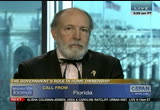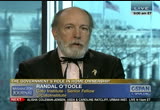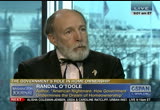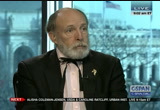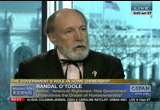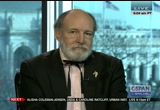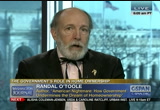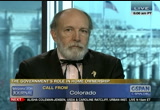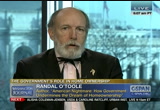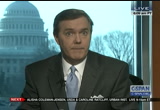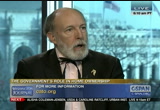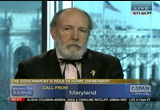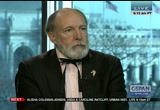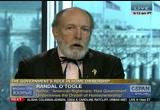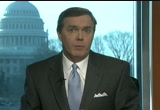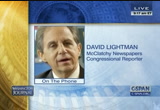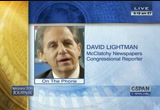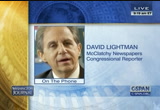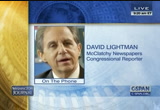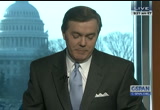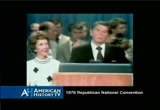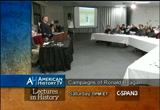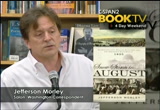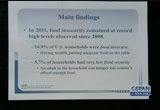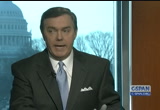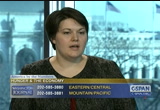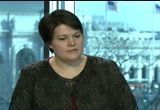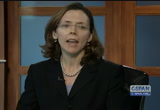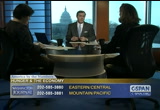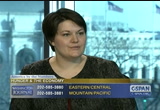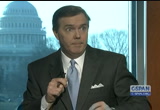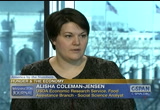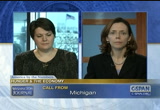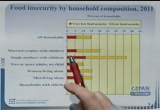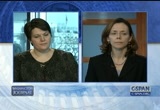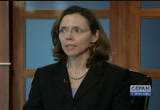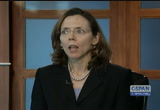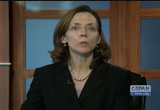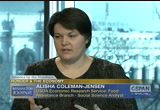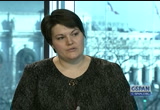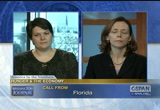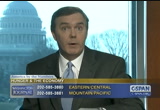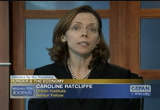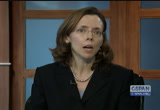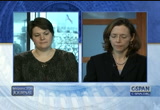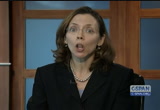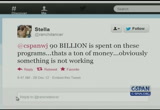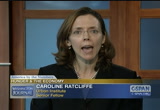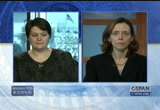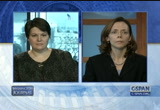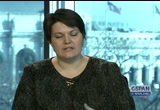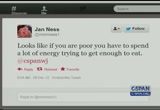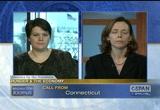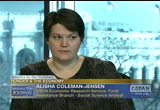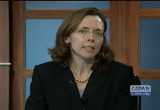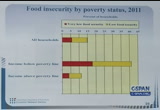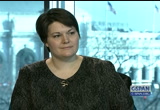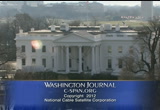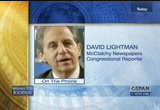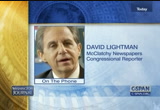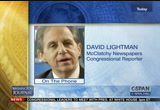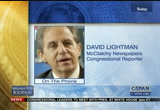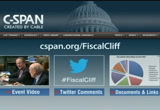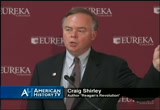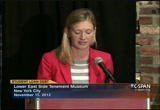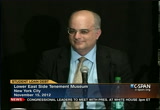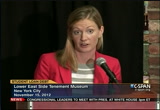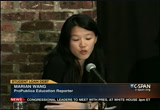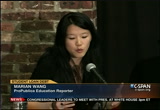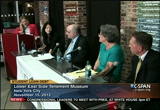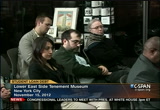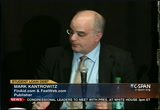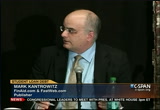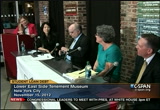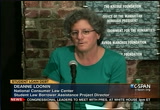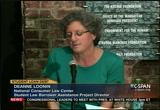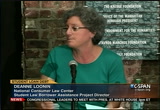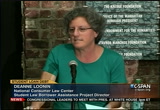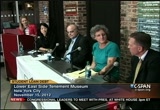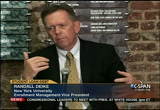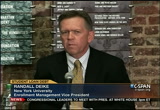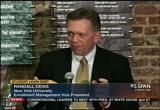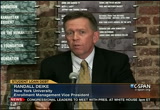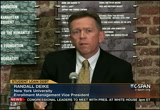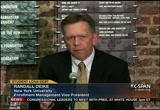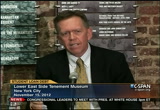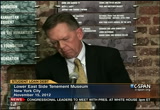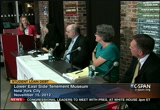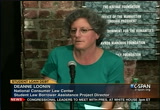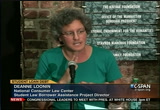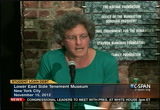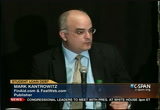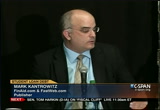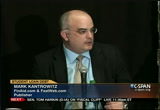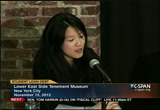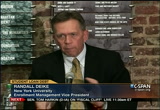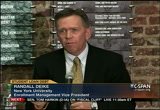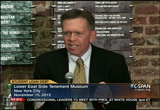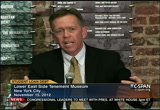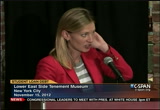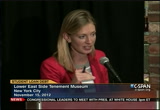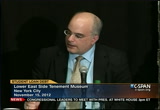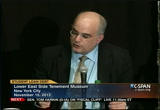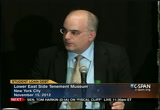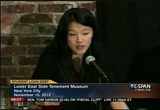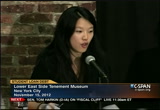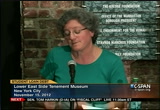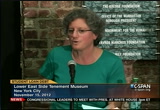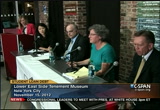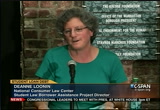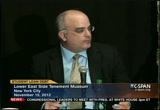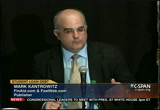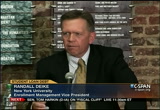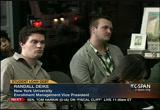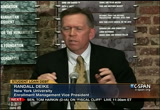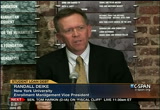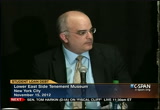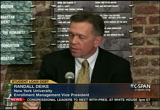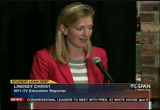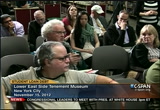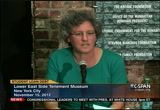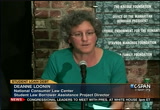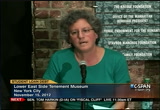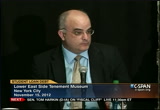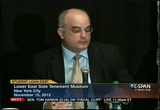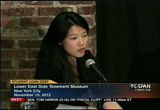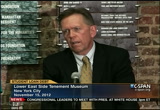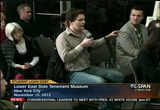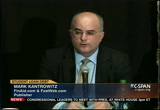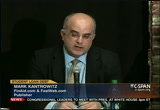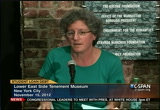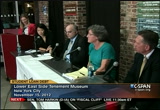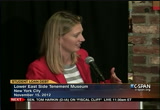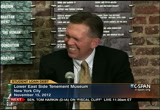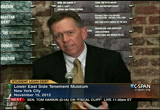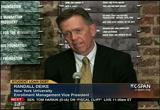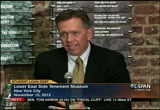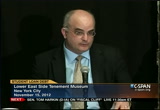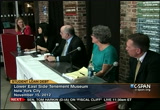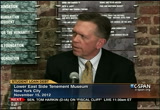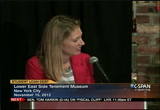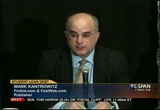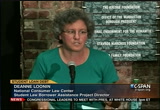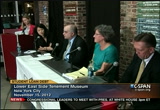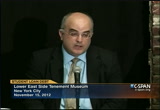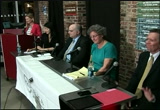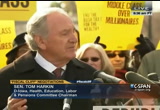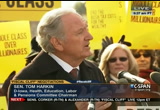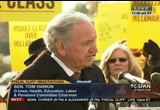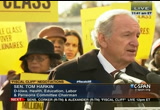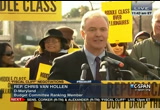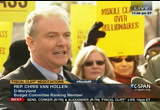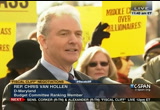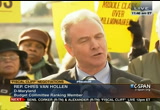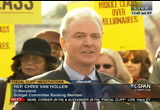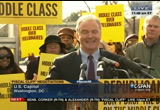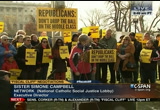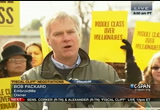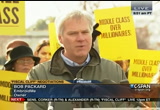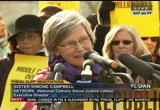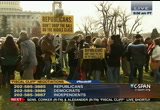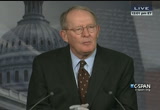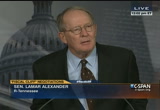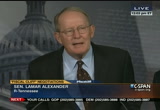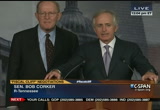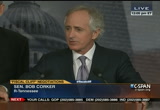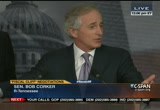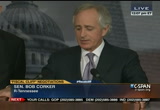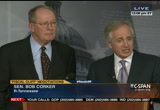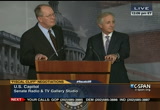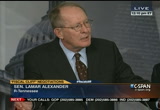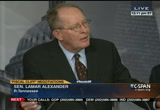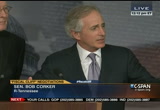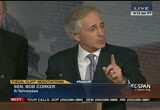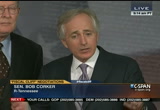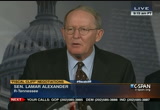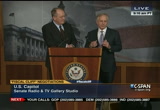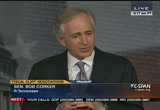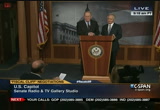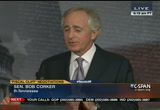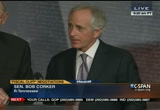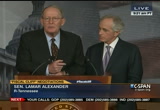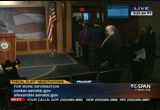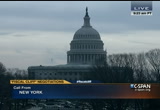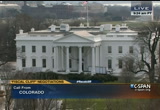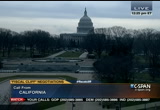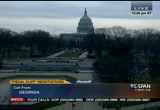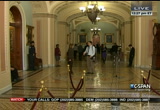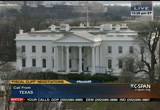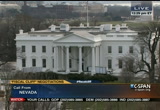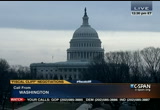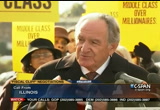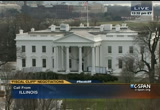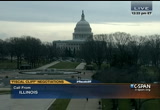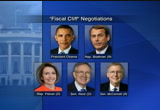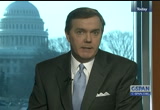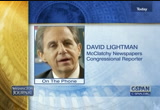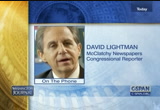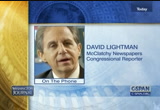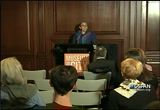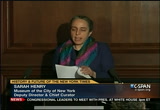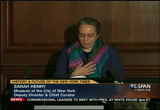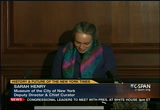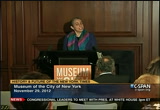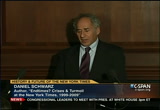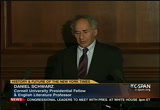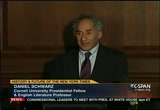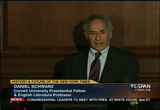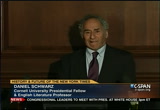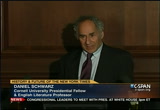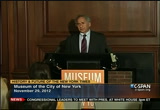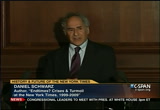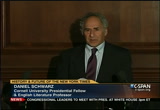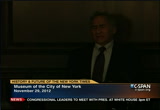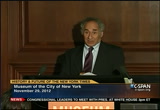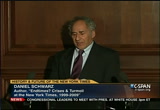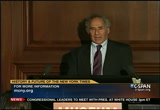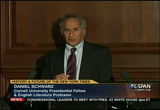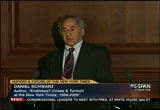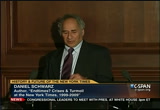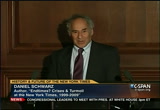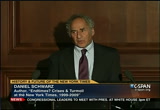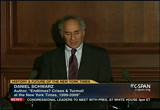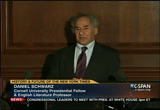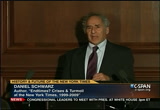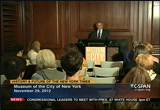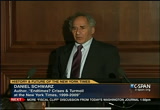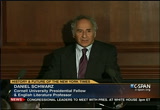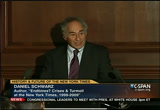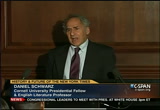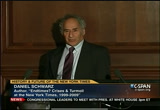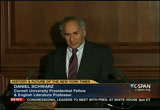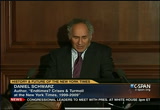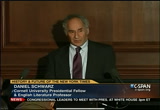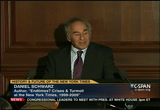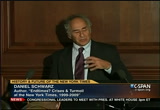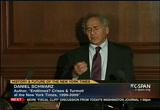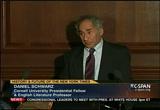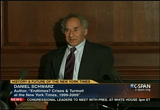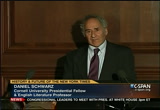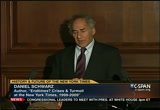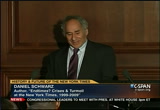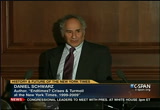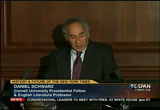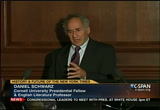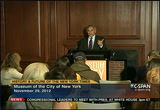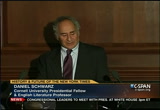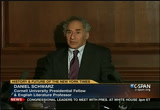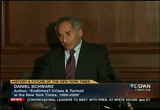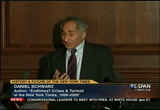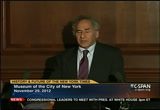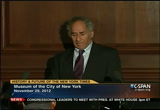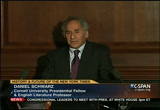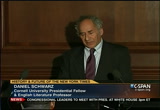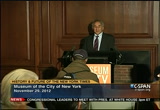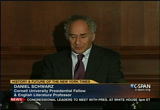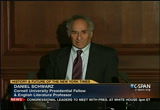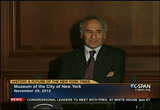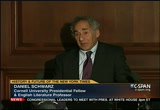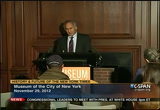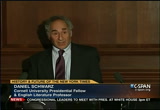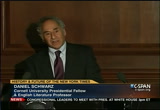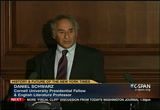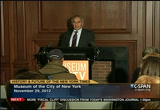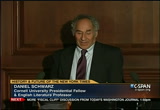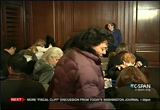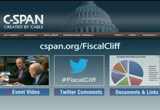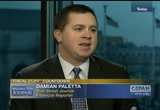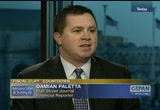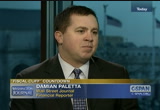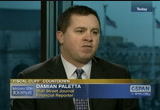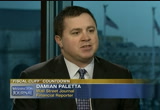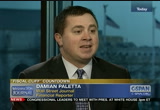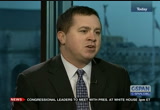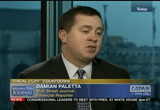tv Public Affairs CSPAN December 28, 2012 9:00am-2:00pm EST
9:00 am
the everglades cannot survive this. our aquifers cannot survive this. this is not a state where the government can just let people build and build and build without some sort. of sort host: thank you. guest: you make a good point, but urban development in florida occupies 10% of the state. most of the -- most of the everglades is protected by state parks. if people want to protect more land, they could buy land and put it under conservation easily, but there is plenty of land available sphere without impacting the everglades in the awkward first. to say that we should confine people to 10% of the state, when you have one of the 3 or four
9:01 am
most heavily populated states, means you are seeing newcomers are not welcome, existing renters can not buy houses, our children cannot buy houses. that is not the american dream, to stand in the way of our future. host: the book is entitled "american nightmare -- how government undermines the dream of homeownership. this is from drake cinders -- what land use restrictions would you approve of? guest: a buy support local homeowners imposing their own -- i would support local homeowners' imposing their own restrictions. this is how it works in houston, which has no zoning. half of the residential neighborhoods have restrictions. if you live in a neighborhood
9:02 am
without restrictions, you are allowed to petition neighbors, and if 75% agree, you can write covenants and restrictions for your neighborhood. if the developer says we think your neighborhood would be more valuable if we changed it, and we will pay you to change, you can vote to do that. that happens all the time. you get an evolutionary system that responds to demand, rather than government winds and fads. >> your thoughts about the federal housing administration, where nearly for 80 years, they have maintained a stable housing market, helping lower and middle-income families enter the housing market through government assistance. guest: that is true in places without wind use restrictions, the when you have something like the fha subsidizing housing
9:03 am
prices, you're creating more instability. host: how do they subsidized it? guest: by providing lower interest rate loans than the private market might provide, which means to an increase in demand, and increases in demand need rapid increases in prices. the price -- decreases mean decreases in prices. that ends up creating a lot of instability. i do not think we need the fha. homeowners of very low incomes were able to buy homes in the 1920's without fh. we do not need freddie mac for the mortgage interest rate reduction. because it is not need the land use restrictions that are making housing affordable in the first place. host: here is some information about fha by the numbers --
9:04 am
insuring in total about $1 trillion in lows, but 739,000 of these homes are in delinquency. the projected shortfall for next year is $16 billion. guest: yes, and a majority of these homes are in states with land use restrictions. ticket did not have these restrictions, housing prices would not collapsed -- if you did not have these restrictions, housing prices would not have collapsed. people would not be in foreclosure. host: cord guest is a senior fellow at the cato institute. ken, independent line. caller: it did not take a genius to see this housing bill was going to bust.
9:05 am
i've seen two bedrooms go for $380,000. housing was way over-valued. realtors, bankers, they were all participating. one more thing on president obama. president obama met with jesse jackson every saturday for about one year, but ever since he was president he did not invite him to the white house one time. all of these black people crazy about obama, you had better think twice. thank you. guest: you were right that houses were overpriced in california, but they were overpriced before the bubble. houses in north carolina might cost you $600,000 before the
9:06 am
bubble, $1.5 million at the height of the bubble, and now down to $400,000 -- four times as expensive as they would begin south carolina, which does not have land use restrictions. host: denver, colorado, ron. republican women. -- republican. caller: good morning. it seems like the community reinvestment act that was passed in 1975 more or less laid the foundation for the housing bubble as that was the beginning of the sub-prime. that evolves and was expanded upon. business took advantage of it. because of that we get the ball. the -- bubble.
9:07 am
the cra is still on the books, and sub-prime loans are still being made. i was wondering, do you think a major part of the foundation was the community reinvestment act and ended should be eliminated? he called the community reinvestment act, i do not think it had as big or roll was people like to say. housing was already expensive in places like california and hawaii because of land use laws from the 1960's. second, if you look to the community reinvestment act, if you think that is the cause of the bubble, you have to explain why there was not a bubble in houston, raleigh, n.c., that
9:08 am
winter? -- atlanta? it applied to those cities just as much as san francisco and miami, yet there were bubbles there and no balls in houston, omaha, -- bubbles in houston, ohio, -- global hawk, where have you. host: you conclude the book with "home ownership is not just an american dream, a dream of people all over the world. guest: that is absolutely right. a lot of research has shown that homeownership is one way to help people get out of poverty. if you want to start a small business, it turns out most are
9:09 am
started with a loan on a business owner's home. if you want to put your kids through college, you can borrow against your home. homeownership is a way to build wealth. yet we have government saying we should get more people into apartments, fewer people into cinder the -- single-family homes. host: what is the track over last -- >> 8-to-10 years? guest: if we get rid of land use restrictions, i am optimistic, but if we do not, housing prices will go what, then we will be poised for another big financial crisis. host: john joins us from michigan. independent. caller: good morning. thank you for educating people on your television show.
9:10 am
we live in a community where we are experiencing exactly what you're talking about, particularly businesses, and i am talking big businesses. they do not like where the doors are located, or this department over here, and what they are doing is restricting jobs and tax base. i would encourage people to get involved in your institute and fight this because it is not doing anything for the economy or our country. merry christmas to everybody. host: john, thank you for the call. what is the history of the cato institute, founded in 1977? guest: it was founded to promote liberty and economic freedom, starting in san francisco, and then move into washington, d.c. milton friedman admitted the kindle institute has never sold out. we still work for liberty and
9:11 am
freedom. i've been working with the cato institute since 1995 and full time since 2007. host: mary, fort washington, maryland. democrat. caller: i would suggest thinking that if you follow all of the problems come at the end of the trail you will find the smiling grin of greed. that is what i think caused it. for myself, naca program helped us, taking us out of the ugly arm. my mortgage is $964 a month, which will allow us to stay in
9:12 am
our home comfortably. guest: people blame things like a financial crisis on greed, but greed is not changing. it has been with us for hundreds of thousands of years. people are greedy naturally. if we design institutions assuming people are altruistic, we will get hurt. we have to assume they are greedy, and if there altruistic, we will only benefit from that. we assume that people want to live in their own home, and give people a choice, buying or renting without imposing huge restrictions, people can do that. when we start imposing restrictions, we create problems. host: john cit -- john joins us from georgia. good morning. caller: political entrepreneurs
9:13 am
are greedy for power, coveting our wealth and welfare-creators. the evidence is the federal government level of spending doubling every 10, 11, 12 years. what percentage of the american people's income doubles every decade? very few. most of the wealth that could be going through -- to enterprise, look to washington. when it comes to agenda 21, randal o'toole, i would like you to comment on that effect putting land-use restrictions. guest: a lot of people raise agenda 21, the document from 1992 that endorsed the kind of land use restrictions that i am concerned about. these land use restrictions actually go back to the 1960's
9:14 am
in the united states. agenda 21 has not effected the land use restrictions, but it is merely a symptom. look at hawaii, california, oregon, vermont -- they were passing these kinds of laws in the 1960's and the early-1970's. this is a home grown problem, not a united nations problem, and is a multi-trillion dollar problem that could cause a shift in the economy. host: beyond land use restrictions, what surprised you in researching this book >> guest: it was surprising to find a working class families in the 1960 -- in the 1890's had much higher ownership restrictions --
9:15 am
home ownership levels than middle-class families who did not want to own homes because they feared a working-class family would move in next door to them. by treating zoning and the war on sprawl, they were able to drive prices up. it made me suspicious when people talk about zoning nowadays. it is not a way to protect property values so much as it is to protect to discriminate against lower income people and i am not enthused about that. host: the book is entitled "american nightmare -- how government undermines the dream of homeownership. the offer, randal o'toole of the cato institute. -- horizon -- "american nightmare -- how government undermines the dream of homeownership." the author, randal o'toole, thank you. let's share some headlines with
9:16 am
you. this is from "the new york times ." this is from the business section of "the new york times." there is this from the money section of "usa today." from "the wall street journal," and this headline from "the washington post." we have news from morning programs, where chuck schumer told nbc that he is in courage to mitch mcconnell his getting actively involved in talks. republican senator john stone noted the meeting among the
9:17 am
president and congressional leaders is encouraging because people are talking. we want to check in. in the two hours since we last talked, any news you could clean? guest: no disrespect, but no. they are realistic these things often get resolve the blessed minute. it would not shock me if we are still talking like this 48 hours from now. the deadline it is 11:50 9:00 p.m. on the first. it looks bleak, but there are only five or six people that really know what is going on, and they are not talking to us. the effected they're talking to each other is encouraging. -- the fact that they are talking to each other is encouraging.
9:18 am
host: let's walk through the scenarios. there is a meeting this afternoon, which is significant. a lot of negotiations have been between the president and speaker john boehner. >> november 16 was the last time and the only time they met. it's going to happen? we expected bombshell announcement? no. the thing to watch is are they going to keep talking? will these they are we going to see everyone tomorrow? in 1994, they would go to andrews air force base, can't david, but they would keep talking. -- camp david, and it would keep talking. what will happen on the floor of the house and the senate? the senate has to take a pay bill, and then it, and send it back. when they agreed to that? a third thing we need to watch
9:19 am
is the tone. if everybody says they're hopeful, that is important i go back to last friday, after speaker boehner's plan b, which would have taxed millionaires had a higher rate, fizzled. he had a press conference that was angry and criticizing democrats, but at the end he said he was hopeful, and that was the news. host: maybe we should send your dog in the meeting. guest: she wants to know who will pay for dog food next week. host: if there is no agreement, what will the congress face? guest: i did not yen will be as apocalyptic as we think. it is a question of what the markets do. the congress comes in at noon on january 3. it does not take a lot to reintroduce legislation. i think what will motivate this congress will be the markets. if they come in at noon, and the
9:20 am
dow was down hundreds of points, they will act fast. they will be scared. if the markets did this and could signal that they are doing now, i do not think the urgency will be there. host: finally, the dynamic in the room, the relationship between the principals. guest: people talk about the lack of the relationship, but these people are professionals and they know how to legislate. all six of them in the room today have worked across party lines. nancy pelosi, she worked with george w. bush in 2008 to craft a stimulus. they worked together on tarp. mitch mcconnell voted for tarp i could go on and on. for all of the tough talk, look at the word hopeful or
9:21 am
optimistic. it is there. host: we will john boehner face a challenge to speaker? guest: there is grumbling, but the feeling is no. i did not think so. one of the most significant things that happened, going back to that press conference one week ago when the talk was in the air, eric cantor stood by his side, and that was a signal that if anybody is going to challenge him, it might be eric cantor. he will not challenge. he is absolutely on board. host: david lightman, thank you as always for being with us. guest: thank you for having me. host: we will check in with you again and your dog. every friday we look at america by the numbers. today, we want to focus on the issue of hunger in america.
9:22 am
"washington journal" continues. negotiations are resuming this afternoon at 3:00 p.m. eastern time. [applause] >> there are cynics said that a party platform is something nobody bothers to read and it does not amount to much. whether it is different this time than it has ever been before, i believe the republican party has a platform that is a banner of bold, unmistakable callers with no faded or pastel shades. >> you see the evolution of
9:23 am
ronald reagan. he speaks in his speech about hope, a future without nuclear weapons, but it is more progressive and optimistic in 1976. you can see his anti-communism is evolving. his cultural view is evolving. he is not yet gained or acquired the tax cut philosophy that fit nicely into his optimistic outlook of empowering individuals. >> saturday night at 8:00 eastern, craig shirley, on the political campaigns of ronald reagan.
9:24 am
>> you think of washington in 1835, 25 years before the civil war, what would you think? slavery was well entrenched, the black people were miserable, the whites were cruel and indifferent. that is etched -- actually not true at all. washington had about 30,000 people. 12,000 were black. the majority of the black people in washington in 1830 were free. >> what led to the washington, d.c., first race riots? "snowstorm in august" sunday night on c-span2's booktv.
9:25 am
"washington journal" continues. host: on fridays, we look at america by the numbers, and we want to look at hunter in america with caroline ratcliffe, and -- hundred in america, with caroline ratcliffe and alisha coleman- jensen. as you look through these figures, what surprised you the most? guest: thank you for having me. just to talk of all our main findings, our latest statistics aren't based on 2011 and the annual food security survey conducted in december, 2011, and we found that 14.9% of households were food insecure, lacking consistent access to adequate food. we found the rate has hovered
9:26 am
around 14%-to-15% since 2008. it was at 11% in 2007. host: let me go to some headlines. the 15% of these households have trouble putting adequate food on the table. the question is why do we have hunger in america? guest: that is a great question. we have a number of programs targeted at reducing food insecurity in this country, but we have high poverty rates in the country, high levels of unemployment, and it contributes to the levels of food insecurity. host: one of the issues the first lady has been pushing for is more grocery stores in the inner city area and healthier choices. does that contribute to the
9:27 am
problem -- people not able to go to supermarkets? guest: there is concern about areas where there is difficulty getting enough food and access to food, which could contribute to the problem, exactly. host: what are the major government programs designed to deal with this issue? because there are several designed to deal with food -- guest: there are several designed to deal with food, and one is the snap program, formally food stamps, and then the wcks program, and in the school lunch program. host: how many people over all
9:28 am
rely on these programs? guest: for the snap, the former food stamp program, it is about 47 million individuals. for the school lunch program, it is about 30 million children breakfast is about 10 million, -- children. breakfast is about 10 million. host: let's define food insecurity and -- not able to provide adequate food for one more household members due to lack of resources. then you have very low food secure households were normal eating patterns were disrupted and food intake was reduced below the level that is considered appropriate. can you elaborate? because these are households experiencing food are chip -- guest: these are households
9:29 am
experiencing food hardship, not able to provide balanced meals. the more severe condition, the sub category, that is the more severe rage where household members are actually experiencing inadequate food intake. they might be skipping meals or cutting the size of their meals, or in more extreme cases, going a whole day without heating. -- without eating. host: caroline ratcliffe, he focused on consumer habits, and one of the results was the food we had did not last. when did not have enough money to get more. guest: that is part of the numbers that alisha coleman- jensen was showing. we know that these programs were successful in reducing through
9:30 am
hardship among families. there has been some research -- prove hardship among families. after is been some research done on the stamp program, looking at how to dissipating in the program has reduced food insecurity, -- looking at how the program has reduced food insecurity. also, school lunch and breakfast, children participating in this plan has reduced insecurity. host: as with the key issue of food and the topic of hunger in america, we have divided our phone lines regionally. explain this chart as it could
9:31 am
food security of the insecurity, but employment right, and the very low food security. guest: there was an increase from 2007-to-2008. food insecurity has been stable between 40% and 15% since that time. -- 14% in the 18% since that time. the very low security, those are experiencing reductions in food intake. that increased from 2007-to- 2008. we saw a modest decline in 2010. the green light on the graph shows the prevalence or the average annual on employment right, and we see the unemployment rate increased and
9:32 am
continue to increase while the food insecurity rate remains stable. we think this is evidence that the safety net kicked in to support families at this time in the modest increase in benefits associated with the stimulus helps to reduce very low food security. host: we've gone from 10 years ago, and about 2.5%, just below 3%, to approaching 6% this past year. guest: food insecurity and very low security increased with the recession. we have been measuring since 1995 and we are seeing highs recorded levels since we started measuring. host: do you want to follow up? guest: since we have seen this increase in food insecurity, increases in snap participation,
9:33 am
so people might say why do we have food in security at a record high levels, and i would say it is the great recession, the big impact on economic security and a lot of instability in employment. we also had the foreclosure crisis which impacted homeowners and renters that were in homes that were foreclosed upon. here there has been a lot of instability for families, and that could create insecurity around food. host: caroline ratcliffe, a senior fellow at the urban institute, and alisha coleman- jensen jensen, a social science fellow at the usda. i want to show this map, which might surprise people. virginia, maryland, pennsylvania, new york, they
9:34 am
have less food insecurity. in the deep south, states like georgia, alabama, mississippi, texas and in california, there is more food insecurity. why? guest: there is regional variation, ranging from a low of 8% to a high of 19%. research has shown there are factors for households within the state, and also factors like economic conditions at the state level and state policies that affect food insecurity. the poverty rate in the unemployment rate varies across states, the level of education berries and other factors such as region varies, and other factors such as participation in food programs varies. the cost of housing, the average wages -- all of these
9:35 am
factors affect food insecurity. host: susan, dayton, ohio. good morning. caller: i really admire the program and an emphasis on nutritious food, and i was wondering if there were any thoughts going toward that same thing with the snap program. guest: there has been some focus in moving to healthier foods in the step program. there are some pilot project. new york has a program where if you buy food you basically get the double value of those programs. there has been movement toward healthier food. new york city tried to the
9:36 am
institute a policy where you could not buy soda with snap benefits, and that is not moved forward. i think as we go forward we will hear more about nutritious food. host: a comment from a court twitter page -- foods security will increase as companies the war rages and people qualify for public assistance, -- lower wages and people qualify for public assistance. detroit, michigan. good morning. caller: good morning. the people that are hungry are the people that are working minimum wage. the people on food stamps are at the supermarket, selling food stamps and their kids are hundred -- agree. why is that?
9:37 am
-- horizon -- hunger. why is that? guest: there is an issue with working a full-time job at minimum wage and being eligible for food stamps. the program is really targeted for low-income families, families with income below 130% of the federal poverty level, and it is targeted at these working families. host: going back to the method we talked about, one dealer said in this tweet, saying food insecurity is lowest in the corn belt area. amazing. we look at all households, and very low food security is at 5%.
9:38 am
the highest percentage, no surprise, single mothers with children. guest: households with children in general have higher levels of food insecurity than all households, and single mother households with children tend to have the highest rates. host: it is an almost 37%. guest: exactly, in 2011. host: this area, houses with the elderly is the lowest amount still high. guest: kelly adults tend to the lower -- elderly adults tended lower issues of food and security. caller: i am calling to find out if you have the number of households getting food stamps by ethnic groups, and if you do, where you get your research? who are your sources host: thank
9:39 am
you for the call. -- sources? host: thank you for the call. guest: the data comes from the population survey, which is also the source for the unemployment statistics, and every december we ask about the food situation in the household, asking questions about food security. we surveyed 45,000 households every year. we estimate range of questions about food insecurity and determine their status based on those responses. host: does the snap program have a photo id? guest: in new york city, for example, they have this biometric technology, where they think print individuals -- fingerprint individuals to make sure they're not committing
9:40 am
fraud. that is been controversial. host: alisha coleman-jensen -- food insecurity by poverty status, 2011 figures. guest: food insecurity and is often related to a lack of economic resources, and we find the prevalence is quite high with household incomes before the below the federal poverty level -- below the federal poverty level. host: another tweet -- , corn is wasted on making fuel while people are going hungry. is that part of the problem? guest: i think it is more of an economic issue than a supply issue. we're looking at low income families and resources to purchase the food.
9:41 am
host: spat and island, extension -- step and island, new york. caller: i want to not focus on the specifics. i would label many dinos and r hinos as cinos, holding to their corporate funders more than people in the state. guest: i am one point to make their. the food stamp program was in the news during the presidential campaign. there was a lot talk about caseloads going up, implication was that these caseloads should be cut and that is a bad thing.
9:42 am
when we learn from the greek reception is that the snap program is the key safety net program for low-income families, there to support families when their high levels of unemployment and party rates. i would say that these high rates of participation in the snap program are a good thing, and we need a program that is counter-cyclical when the economy goes bad. host: alisha coleman-jensen, what income level qualifies you for snap benefits? guest: i do not have the exact income level. it is 130% of poverty. guest: a little below $30,000, and it is done on a monthly basis using these annual numbers, about $2,500 a month.
9:43 am
host: one of your findings might surprise people looking at a year-long basis. during a 30-day time, it is lower and more chronic during a 12-month basis. it detailed the statistics, kicking% of households -- guest: the statistics, 15% of households, it experienced food insecurity for one month, they would be included, and we find that food insecurity tends to be recurring, but not chronic. most food insecure households are food and secure for several months of the year, on average seven months out of the year.
9:44 am
a smaller minority our food and secure for longer. -- are food insecure for longer. about 8% were from insecure. host: our next caller is keith, florida. caller: good morning, merry christmas and happy holidays. i commend you for the work you are doing. between charities and the government, how many different food programs are there? you have the boy scouts collecting, the school free lunch, the school free breakfast, and in florida we have food banks that send food home for kids on off days. also, are the poverty rates adjusted for the local areas on
9:45 am
the price of living? since the government has gone into the business of fixing the party, it seems to have gotten -- poverty, it seems to a gotten worse. there was a piece about free christmas dinners for people that needed it, and they were driving new cars, but it seems like a lot of people that should not be getting it are getting it, and in the food system, there used to be things talk about the pyramid of life, with food first, and it seems to of turned around, and food is left on the list of these households. host: thank you for these points. guest: i think he makes a great point about other programs -- nonprofits, food banks,
9:46 am
pantries, food -- soup kitchens. he mentions these programs that are provided where nonprofits are providing resources, and a lot of people who are receiving public assistance are also supplementing that with these other types of food programs. so, the backpack program is one of them, where children who are low-income, the rotary club administers it, working with the family to find out information about allergies, and food is provided in a backpack on friday for the weekend. they bring the backpack back in on monday. to the second point, poverty is a big issue and the great recession hasn't acted a lot of families -- has impacted a lot
9:47 am
of families with employment, and you might say there are people that my nine need those resources in some of these nonprofits -- that might not need those resources in some of these nonprofits, and there have been discussions about people better lonely going into the soup kitchens, but there is a great need and the great recession has shown us that. host: one of our viewers? if you can comment on the issue of food deserts'. guest: that is an issue where there are fewer places to buy food and it is more difficult for people to get there. it is an issue that has been coming to light and there is more focused on that. host: surely, iowa. caller: a did not call in about
9:48 am
this, but since i know something these ladies evidently do not and should, the ethanol that is made is only used as a shiver, and the rest of the corn is used for livestock feed. one of the things that i've learned years ago is that the government military decided we had to have wecards. we have not had -- food cards. stamps.t had food since china and russia when to communism because of starvation, it would be best to keep people do not have much money. one of the questions that i wanted to guess is you're not given any costs or payments --
9:49 am
let's see a mother or a child on food cards. how much per month do they get? according to my computer, they would not get enough to eat very well. host: thank you. guest: so, for a family of four, let's say, two adults, two children, the maximum benefit for a family of four would be $670 per month. it is in low-cost diet. that is why we likely see a lot of use of these programs along with other assistance. the caller is right that it is not the supplemental nutrition assistance program -- now the
9:50 am
supplemental nutrition assistance program, but these are electronic benefitcards. host: as you deal with these issues, you also deal with obesity because often these families are eating less than healthy food or fast food. guest: that is true. it is complicating when you try to talk about them together. it is important that you remember that many of these food insecure households have a lower quality diets than we might hope, in in in some severe cases, households are having reductions in food -- and in some severe cases, households are having reductions in food, relying on food that might not be healthy. host: this is from stock -- $90 billion spent on programs, obviously something is not working. guest: we know these programs
9:51 am
are reducing food insecurity, as i mentioned, and there have also been worked looking at food insecurity, participation in these programs, and health outcomes. in a large sense, these programs are working. we know that children better food and secure a more likely to have health problems, to have -- food in secure are more likely to have health problems, iron deficiency and hospital stays. we know that is expensive, and there has been research done that is really looking at how people got food stamps early in childhood, and they found that children who had food stamps from their earliest time in life, they were less likely to have health problems in
9:52 am
adulthood. that is looking at a measure of how bad includes obesity, heart disease, diabetes, high blood pressure, so when we think about these programs and their impact, we need to think beyond today and being hungry but the nutritional content down the road. host: our guests today lifted food insecurity and hunger in america. caroline ratcliffe and alisha coleman-jensen. we are joined by -- from lebanon, ore.. caller: i was never surveyed. i'm a single mother of one teenaged boy, and we get a little over $5,000 a month -- $1,500 a month in disability.
9:53 am
if we did qualify, it would be for about $10 a month. it costs two hundred dollars a month to buy food and gas and clothes for my son. we go to food banks. unfortunately, we cannot control the kind of food they have. a lot of times they're not fresh vegetables. the person in iowa, a one to let her know that i didn't think there are statistics of their. and not hearing anything at all. host: do you or your son go to bed hungry at night?
9:54 am
guest: we do not because -- caller: we do not because i use every resource, there. i ask neighbors, family, and i do whatever i can. no these teenage years are important for his growth -- i know these teenage years are important, and a lot of things are full of all kinds of crap, excuse my language. host: thank you. guest: the first point, asking about who we survey, we surveyed about 45,000 households each year. of course, there are many households not serve it, but it is a representative sample. we get a picture based on this sample.
9:55 am
her point of having difficulty with accessing the income cutoff is difficult, and i think it is important that we recognize that federal government programs are working with local nonprofits to help families that are just on the margins to help afford the food for their families. guest: talking about 130% of the federal poverty line, it is simplistic. the rules to become eligible are complex, and as your income goes up, your eligibility goes down. host: this follow-up -- if you are poor, you'd have to spend a lot of energy to get enough to beat. john, connecticut.
9:56 am
good morning. caller: good morning. i was calling to mention low- quality food and the cost of health care, but you covered well. do you think it would be more beneficial if they start doing a local farming program where they could start growing vegetables? maybe have some land with tiles and chickens, and local people could work on the farming areas and return the food to the communities as opposed to being so reliant on high-salt diets, the foods we would coin as having a long shelf life, leaving it on the shelf for six months without going bad? has the government been able to look into those programs,
9:57 am
considering the finances involved in the program as a whole? host: thank you. a related topic -- the availability of this fresh produce is a big distraction for many. guest: there are some programs that speak directly to the point, one our farms-to-school programs, directed to help know where food is coming from and getting fresher food into the schools. in addition, we talk about the wic program, which focuses on healthier food, and foodwic packages have revised to focus more on fruits and vegetables. host: jessica, north carolina, good morning. caller: i was going to save
9:58 am
something similar to the previous caller. basically making it available for people to use ed farmer markets, so more former markets would open in the urban areas, and have almost like a center each district where they could have a community garden, and people could come trades -- and make trades like for jewelry and stuff like that, and people who need produce could receive the food stamps and that transaction would be approved. host: thank you for the call. guest: i think getting fresh fruits and vegetables into homes is important, especially for children. in some places, they have been moving to allowing food stamps to be used farmers' markets,
9:59 am
doubling the value of them. also, there are a lot of community organizations. and the community level, there are firms where they produce fruits and vegetables and that would go to the food bank and be distributed. host: one last chart to summarize what we have been talking about -- food insecurity among all households, poverty lines and it comes both above and below the poverty line. guest: food insecurity is higher for households with low income and the low poverty, and there are also households above the poverty line their food and secure. it is to decree related to resources and income, but there are -- food insecure. it is often related to resources
10:00 am
in income, but there are other factors, and we have reports that examines the problems of food insecurity among people with disabilities, and that is an important factor that we need to consider. food insecurity could result from a lot of factors. host: caroline ratcliffe, your number one take away? guest: food assistance programs are very important, they should be protected as the country moves forward with the budget and fiscal cliff negotiations and there are payoffs down the road for expenses today. host: caroline ratcliffe, the urban institute, and alisha coleman-jensen of the u.s. department of agriculture, social science analyst. thank you for being with us. withwe have coverage on a websie
10:01 am
about the fiscal cliff. we will learn later today as the principles gather at the white house for a meeting that will get underway at 3:00 p.m.. the president, vice president, john boehner, nancy pelosi, and harry reid and mitch mcconnell and if there are any statements after that meeting, and if the president has anything to say, we will have coverage of that on c-span and on c-span radio and always on c-span.org. thank you for joining us and enjoy the rest of your weekend. we'll be back tomorrow at 7:00 a.m. eastern time. [captioning performed by national captioning institute] [captions copyright national
10:02 am
cable satellite corp. 2012] >> in live look at the executive mansion where negotiations on the looming fiscal cliff move down pennsylvania avenue to the white house today. house and senate leaders meeting with the president to continue work. the meeting is set for 3:00 p.m. and we will monitor any news that comes from that. c-span cameras standing by. now back to the capital. the senate is in for business today. lawmakers are working on the foreign intelligence surveillance bill and also emerged to funding for sandy recovery efforts. the house and senate standing by
10:03 am
to consider any fiscal cliff update. we had an update earlier from a reporter covering the issue. host: let's begin with david lightman. white house. the best sense of what you think the dynamics will be inside the room at the 3:00 p.m. meeting. guest: it wouldn't shock me if we're talking 72 hours from now. the deadline is 11:59 on the 31st. we have seen this on and on. there are five people that know what is going and they are talking. host: let's walk through the
10:04 am
scenarios that we can expect. the meeting is at the white house. democrats and republicans. this is the first time they have met since the election. guest: november 16 was the only time they met. it is good news they are talking. are they going to keep talking? will they say, "we will see everybody tomorrow." they would keep talking. what is going to happen on the floors of the house and senate. the senate needs to extend the tax rates a year and amended and that can be done in a matter of hours.
10:05 am
when they agree to that -- would they agree to that? we also have to watch the tone. i go back to last friday. there was a press conference and 95% was angry and criticizing democrats but at the end, john boehner said he was still optimistic. host: maybe we should send your dog in. if there is no agreement, mobil the new congress face -- what will the new congress face? guest: it depends what the markets do. doesn't take a lot to get legislation on the floor.
10:06 am
if we have gone over the cliff, what motivates congress is the markets. if the dow is down hundreds of points, they will act fast. if the markets are giving a tentative signal, i do not think the urgency will be fthere. host: the relationship between als?principle guest: these people are pros. all six people have worked across party lines. nancy pelosi work with george w. bush back in 2008 to craft a stimulus and work later on tarp. i could go on and on but this. look at the last sentence of
10:07 am
what they say and look at the word "hopeful" and "optimistic." host: will john boehner face any challenge to his leadership? guest: i do not think so. go back to the press conference a week ago. john boehner cannot for the press conference -- came out for the press conference and eric cantor stood by his side. he is not going to challenge him. he is on board. he has been a loyal lieutenant. host: david lightman, k for being with us on this friday -- thank you for being with us on this friday. >> more coverage on our website.
10:08 am
you can follow a twitter feed by reporters. all available at c-span.org/f iscalcliff. >> there are cynics who say that a party platform is something that no one bothers to read and it does not very often amount to much. whether it is different this time than it has ever been before, i believe the republican party has a platform that is a banner of bold, unmistakable colors with no pale pastel shades. [cheers and applause] >> the 1976 campaign is interesting because you see the evolution of reagan, his mind, his philosophy as a politician. he talks in this speech about hope and about the future and a future without nuclear weapons and an america free without nuclear weapons being aimed at
10:09 am
them but it's a more progressive, it's a more optimistic view of the world than, say, 1976. it is not just a denunciation of big government liberalism or big government programs. you can see his anti-communism is evolving, his cultural view is evolving. he has not yet gained or acquired the tax-cut philosophy which fit so nicely into his optimistic outlook of empowering individuals to determine their own lives. >> saturday night at 8:00 eastern, craig shirley on the political campaigns of ronald reagan, part of four days of american history tv, right through new year's day, on c- span3. >> parents are being saddled with student loans that they cannot afford to repay. marian wangg and deanne loonin
10:10 am
took part in a discussion on student debt. this happened on in november 12 and is about one hour and 20 minutes. >> with a degree comes student debt. i'm really happy to be here tonight. i have not had as much time over the past two weeks to be thinking about these big-picture issues. we have been in such crisis with city. it is great to take some time and to have this venue and this whole setup to discuss these things, and these issues. i think propublica does a fantastic job with this, as they do with everything. i am happy to be here. we do have a fantastic panel
10:11 am
that spans the array of experts you would want to be discussing this issue. marian has been covering this for propublica, and a month ago had a fantastic piece that seems to be the work of months of investigation revealing the debt burden on parents and how that has been a real issue here that not a lot of people have been talking about. howalthough you may have read about it on the cover of the "new york times" today, a month ago is when you would have first read about it. next to her we have a publisher and author of a best-seller called "secrets to winning a scholarship." next to him is deanne loonin, an attorney with the national consumer law center and the author of several publications including "student loan law," and "a guide to surviving
10:12 am
student debt." next to her is randall deike, the n.y.u. chief enrollment officer. he is in charge of the office of financial aid. and the office of institutional research. so, to get into the solutions oriented discussion we're going to have today, the problem is something i think everybody is very familiar with, but i think sometimes google's of the sale -- auto fill is an interesting harbinger. if you type in student loan, it will suggest student loan forgiveness. if you type in student debt, it will suggest student debt crisis. this is a problem many people worry about, whether it is at 3:00 a.m. when they cannot sleep or in the hospital staring at their new baby and wondering, how will i do this
10:13 am
the way i want to, the way maybe my parents were able to manage in a previous generation. it is a massive issue. the average student graduates with $26,600 worth of debt and over 13% default within three years. we have more outstanding student at than auto or credit- card debt at this point. many may think it is good that we have more student debt than credit-card debt, but not if we are not able to pay it back. the current job market and the great recession have made it much worse. so, the problem. i want to have maryann talk -- marian talk about her
10:14 am
incredible investigative work into how this affects parents. first of all, what are the biggest concerns without population about this debt, and what are the potential solutions for the parent's side? >> we chose to start with the parents because the federal loan program for parents to borrow through to pay for their children's education. people say that federal loans have card caps of $5,000-$7,000 per year. you can only borrow a total of $33,000 for undergrad. -- $30,000-some. but that is not looking at the parent portion of the picture. the parent portion allows you to borrow as much as you need, to fill the unmet need, to pay aur child's way to get to
10:15 am
particular school. there is a credit check that is very modest and there is not a check on income. it speaks to a greater shift. but as costs have grown, perhaps the limits we have had on federal student loans do not meet the needs the students and families are experiencing when they are trying to pay for college. you see the growth in the program where more parents are borrowing from this program. recipients have doubled in the past decade, and they are borrowing more money as well. we thought it was emblematic of the shift in the system. >> would you say the apparent lack of paycheck is one of the
10:16 am
most consistent missing pieces? if someone has an income of $10,000 a year, they can take out a loan for $30,000. >> if they do not have a negative credit history, and we could have a larger conversation about how that is defined, you could borrow much more than you make in a year. >> mark, why do think people are taking on so much more debt than they can handle? handle?
10:17 am
>> the burden of paying for college has shifted from the federal and state governments to the families. the only type of financial aid that has elasticity is the loans. the stafford loans have limits. parent + loans have no aggregate limit. it has nothing to do with the family's ability to repay the debt. the second aspect is the students and parents are chasing the dream, and they will sign whatever piece of paper is put in front of them without paying attention to the details. they figure they will figure out how to deal with it after they graduate. the time to deal with it is before you incur the debt. there are ways to reduce your debt such as attending and in state public college or a college with generous financial
10:18 am
aid policies. that is one of the most effective ways to do that. once you're on campus, you can buy cheaper textbooks and sell them back to the bookstore. but that does not do as much as just going to a less expensive college. >> is the chasing the dream aspect something that in previous generations was possible and able to figure out after work, or is it in knowledge gap in terms of things have changed? and the debt is bigger than it was in the past? why is it more of a problem now, or is it not? >> the debt has grown. when you have a failure of grants to keep pace with the college costs, there are three main ways families deal with it. one is to attend a lower cost college. one is to not go to college. the third is to graduate with more debt.
10:19 am
we see this manifesting itself first and foremost on lower income students. even though college enrollment as a whole has increased, there has been a shift in undergraduate enrollment among low-income students from bachelor degrees to certificate and associate degrees. a good rule of thumb is that your debt at graduation should be less than your annual expected starting salary. if it is, you will be able to pay it back in 10 years. eventually you reach a point where more and more families are graduating with an affordable that. given that they do not have an awareness of what it means to take on this debt, and no one is teaching them financial literacy in high school or college, smart borrowing is something they are not able to do.
10:20 am
but they need. they may be chasing a dream. someone who is getting a bachelor of science in nursing can afford to take on more debt than someone getting a degree in religious studies or a low income field. it does not mean you should abandon the degree. -- the dream. it means you should pay attention to the debt, because you may abandon the dream later. >> not all degrees are worth as much is something those of us who love liberal arts in the united states have a hard time coming to grips with. >> or journalism. >> it obviously makes people
10:21 am
uncomfortable that the situation is further curtailed by the family were born into. if you are a wonderful high school student, you have to think more about your major and your college than a student born into a wealthy family. how do you balance that with the reality of this crisis. >> one of the things we do at the national consumer law center is direct representation of low-income borrowers as well as speak to thousands of borrowers throughout the country. threw out the country. many students do not graduate. there is default. when you think of who the loan
10:22 am
borrower is, the majority fall into nontraditional student categories, meaning 25 or older, often financially independent, often have their own families, so just to have that in mind. the problems of four year traditional students are important, but i think they get disproportionate attention. i have clients in their 30's, in their eighties and in their nineties as well. this is a problem that lasts a lifetime. one thing to sort of answer the question, a lot of this depends
10:23 am
on what we think the goals are of our federal aid policy. i think that is something we can debate a little bit, because historically, the main goals of the aid policies were about social mobility, equal access not just to get into college, but to complete and hopefully succeed financially and help with social mobility issues. looking at that goal, our policies have been a failure. the social mobility part of higher education has not changed much in terms of what family you are born into and what your odds are of going to college. that hasn't changed much over the years. one solution i throw out is that i do not think we should
10:24 am
be limiting opportunity at the front and so much. -- at the front end so much. i think people when they make decisions are not just chasing a dream. this dream is sold to us from the beginning. it is not just a dream. college credentials to impact your income. we all make decisions with an optimism bias. we think we are the one that will succeed. the problem for my clients is not that they make worse decisions, it is that the consequences of their decisions is so much worse. it is not the level of debt. it could be a small debt that spirals for a client. so i think we should not leave
10:25 am
people out to see who is going to succeed. we should look at the back end. we should not hammered people so much if they get into a little bit of trouble. we go after them for ever. we do not give people relief. let's give people the opportunity to go back to school again. that is good for taxpayers too because they're more likely to repay their loans. >> nyu is used as an example in many of these stories because it is a sought after school. and it has a large price tag. you say you are uncomfortable with the parent plus program, but you rely on it like other
10:26 am
schools. what do thing to roles of the schools are? how has nyu been developing policies both from the admissions standpoint and to help students once they get there and end up in trouble? >> first, a little context. i will answer your question. i do not want to sound like the person who will push this under the rug and say student debt is ok, but context is important. we talk about a debt crisis. fit, not for-profit --
10:27 am
the disparity is huge as you look across this issue. we talk about a 13% default rate. it varies from 1% at some institution to 40% at others. it is a broad set of issues. it is a complicated thing. i still described as a crisis. what is our definition of a crisis? i am not going to answer that. i think the context of a crisis, and the dilemma is, how do we find the talented student -- and just so you know, i am a farm boy who has worked at four different institutions with very different missions and six different university presidents. i'm a lucky person as well. i have seen a broad array of university missions, types of
10:28 am
students, profiles of students, and this is an issue across all students, but i do not think it is fair to compare credit-card debt and student loan debt. student loan debt is an investment in the future. there is a payoff, but not to the degree that it puts families and students in a position that will have a significant negative impact on the decisions they make post- graduation. so in my mind, that is kind of the dilemma, but i think it needs to be framed differently than it typically is. it is the crisis component. everyone has debt over $100,000. that is not true. even at nyu, and expensive
10:29 am
institution. if you have ever heard john sexton speak, he will say our financial aid is not what we would like it to be. but even at nyu, the percentage of students with that over -- with debt over $100,000 is very small. i do think context is important. that is where i will start. there is huge disparity across different types of institutions. what we have been doing is a number of things. i have been at nyu about 3 1/2 years. we have affected quite a bit of change in that time. john sexton is completely committed to the following. our goal is to inform families right up front, shop around. nyu is a unique place. our value proposition is different than every other
10:30 am
institution in the country. we have a global network of campuses. we are in -- i am biased, but the greatest city. we are in greenwich village. internship possibilities. we have a world-class faculty. i believe there is a value proposition that is different than other institutions. we are a fabulous place, but we are not the only fabulous place. our message to students from prospect on is about what are you looking for in an institution, what are you looking for in a program? and remember, about half the freshmen who begin this fall will change their major at least once. what are you looking for in a program? small, large, internship opportunities, faculty? what does the place an office look like -- the placement
10:31 am
office look like? one thing to consider should be the financial investment, not just the first year, but across four or five years. families will cobble together a package, a financial package, that will get through the first year, and then they find themselves in real difficulty. our goal is not to scare people away, and not to be the latest. .- and not to be elitist we are working hard to get the limited amount of financial aid we have to the right students. we're completely need based. i could count on one hand the number of merit scholarships that are not need based. we are completely need-based. we are telling families, consider these factors. marks said it well.
10:32 am
do not ignore the financial investment. i meet with a lot of families, and they are wonderful people, but the first thing they say to me is i have wanted to come to nyu since i was four. what could you really know about the university when you are four? you might know that you like new york city or that alec baldwin came here. but it is important to consider the financial aspect. >> is that something you are stressing more now than you were a few years ago? >> it is. there were families coming to nyu that did not have the financial resources to be there, and we were not in a position to provide the resources to allow them to stay. so this is full disclosure. i do not want to sound like we are an elitist institution telling poor kids not to come, but for families thinking about
10:33 am
the future, you have to think about the impact this will have in the long term. that is a strong message that we are sending. the other aspect is examining how we invest the budget we have. i'm talking on the undergraduate side. that is my responsibility. we have made some major changes in how we are awarding financial aid and how we are assessing the financial resources of families. that has had a significant impact. that has been a gain changer for us. we have fundamentally changed how we are awarding lower and middle-income families financial aid. those are the kinds of things that we are doing. >> you were saying the college debt is good compared to credit card debt. i think that's something most anyone would agree with.
10:34 am
>> with a qualifier, but yes. >> the major qualifier for that would be that you graduate, that you end up with a degree, that the college that is not a cliff -- the college debt is not a cliff you never end up completing. especially non-traditional students, some are in the single digits after six years. others are closer to 20% after six years. what is the responsibility of the school to help people get to a degree? whether it is at the place at that they started. i know at a place like nyu, do you expect lots of transfer students, for instance, so that people could do community college and then graduate with
10:35 am
an nyu degree? the alternative is front ending the degree and having it drag on longer. i do not know if any of you have opinions on getting students to graduation and who is there to pick up the pieces when things go wrong in the process. >> i can just say that one thing is -- there is actually surprisingly little research on why people default. empirical research. we did a study this summer which had a very small survey sample, but is shockingly one of the few where it surveyed people who were talked into borrowing and asked them what happened. for the research that is out and completing is not
10:36 am
necessarily going to lead to success. there are some factors, largely in the for-profit sector to some extent, where completion does not lead to financial success necessarily, but in general, completion is important. so i think there are a number of ways across the board that we can do a better job at this. there are some federal and state government requirements to have more information out there about school completion rates and other information about schools. information alone, disclosures alone, in my opinion, are never enough of a consumer protection policy, but they are certainly helpful to some extent. .nd they'll people compare having a consistent way to measure completion is important too. people being able to compare apples to apples is important.
10:37 am
thinking about tying participation in the aid programs two different outcome measures is important. many of you may know that the obama administration tried to start doing that, mostly in the for-profit sector, but not exclusively, and has had a lot of opposition over that. i think we will see more efforts coming in the next four years. and i don't think exclusively in the for-profit sector. the last thing i would say is what i said earlier, which is that for people who do not complete, knowing that this is a factor that leads to default, that we do not make that the final sentence for everybody. ok, you tried it once. let's make it easier for people
10:38 am
to transition out of default, to prevent them from getting into default in the first place. the best way to solve the problem is to help people and of -- end up succeeding. if you have better completion rates, you have your people in -- you will have fewer people in the problem in the first place. >> the key is getting the student who starts to the finish line. the focus on completion rates has a new ones to it. -- has a newuance to it. one of the easiest ways for college to have good completion rates is to deny admission to high risk students. we need to remove the obstacles
10:39 am
that keep students from completing their education. i do not think community colleges are the solution. community colleges are great if you are seeking an associate's degree. or a certificate. but of those who starred at a two-year institution, 20% graduate with a bachelor's degree from an institution where you go for years. two-thirds who starred at the four-year institution finish there. i think we need better disclosures.
10:40 am
they need to have the evidence to back it up. if the students were to hear that two-thirds of the students from this college or going to graduate or drop out with more debt than they can afford to pay, they might walk to a college that is less problematic on equal measure. but what is needed is not just federal disclosure of affordability. the financial aid shopping sheet is a step in the right direction, but better disclosures are not enough when students and their parents do not have the skills to interpret these disclosures. a better financial literacy needs to be taught in the secondary school curriculum. it is not as to the making smarter borrowing decisions, it
10:41 am
is also about helping them be more successful. it is a guide to being a grown- up so that you know how to save for a house, prepare for children, save for retirement, save for your children's education. nobody teaches them that and they need to know that so they can make informed decisions. is not just the information. it is the decisions as well. they need those skills. >> i was just going to add that i do think at the department of education level they are trying to push the consumer information angle and to have colleges have those tough conversations without the department having to come down and actually put a hard income limit on something like a parent plus loan. they want that to happen on the
10:42 am
counseling level. when i talk to financial aid administrators, they are conflicted about it sometimes. who am i? is it my schools place to say that this is too much money to borrow? i'm sure randy can speak to that idea. >> i would be happy to speak to that. there was an article right after that expressed that specifically. financial aid counselors are not financial advisers. we do not know what the financial resources are. we know that they have additional information out there. it is our policy that we are not doing any financial adviser in. -- any financial advising. this is a loan, you have to repay loans. we are not qualified, nor should we be making decisions
10:43 am
for families and telling them that you can't come here because you can't afford to be here. we don't know what additional resources they might have. i have had conversations with families where you need to consider carefully what this is going to mean long term. there are other good options on the table that will not result in the kind of debt you have like going to nyu. short of saying not to come here, they need to think carefully about where they're going to be. let's talk about completion. who should have the opportunity to give it a try? my background is psychometrics and statistics.
10:44 am
i understand standardized testing. we make decisions in the more selective institutions based on a set of characteristics. but we are not perfect at it and there are students that we got, the students that succeed at nyu and they're going to other wonderful colleges. i have worked with the school district, a guidance counselor has 600 students assigned to her. they are not getting any really good school counseling. should they not have an opportunity to attend college? for many of those students, their first opportunity to see whether or not they are capable of doing college level work is if they enroll in a community college. if they are not able to do the work and they are borrowing, they are saddled with loans that. -- loan debt.
10:45 am
i am glad that mark mentioned secondary schools. i'm not pointing a finger at secondary schools. there are huge issues in large school districts, especially, related to family is getting good information, and that is critical solving a lot of these issues. in terms of helping their rights choices tha. it is not a snap your fingers kind of solution. they're very strapped in terms of resources financial and human. it is broader than retention strategies. how do we start the conversation early enough that families and students understand what the expectations are? so that they can be call it ready by the time they graduate. it is a broader and more complicated mission.
10:46 am
>> a perfect segue that i wanted to talk about next, the role of government in all of this, talking about how schools and families and the government can do a better job helping to alleviate this issue for families. one role that the government has is the public-school system. we have touched on that briefly. i think the one aspect we have not touched on is the number of students, especially from lower performing districts, and the number of students that graduate and they needed remedial work. they end up using a lot of their loans taking high-school classes, they have gone through and they are already in debt. that is a big issue in new york city.
10:47 am
that is one huge problem. we also briefly touched on the federal government's role in regulating this whole process and how the push seems to be for disclosure, more information out there will help people be better consumers. the third issue when it comes to the government is the caution that mark issued, the state and-- that mark mentioned, the state and the city universities have been defunded over decades, and that as part of the rising tuition costs. a public university level that -- i read once that every time there is a financial crisis, they cut university's first they never put that back when the economy rebounds. we have had tuition rates go way up.
10:48 am
or classes get a really large. in terms of the government, all those different roles that they apply, how much of this is a problem that the private sector and individual families are not as much to blame for. >> there is plenty of blame to go around. [laughter] we have kindergarten, before kindergarten, and at the college level, someone who graduates is twice as likely to go on. the debt is having an effect on people's choices, like it or not. a government is responsible for it. there are two parts into the equation.
10:49 am
there is the failure of grants to keep pace with college thoughts. the government is also responsible for the failure of the grants. the other side would like to blame the cost, but i think it is both. those are very interesting aspects. you have students on average having as much, and it is completely skewed towards the funds and it has been -- the way -- towards the loans. we have a $15,000 program. that would lead to hundreds of thousands of additional bachelor degrees. the grant pays for itself in the decade. that increased federal income tax rate, it pays for the cost of the po grant. -- of that pell grant.
10:50 am
half of the students are not traditional students, but the half that are, they have a typical work load. yet 10 years to pay back the government for the cost of a grant. then there is a 14% return on investment. it is not as much of an advance from the federal government. we should stop thinking about this as being purely a personal benefit to the students. and there is all sorts of good that comes from higher education. lower crime rates, more likely to vote. there is a lot of good that stems from a college education and as a society, we should be putting the highest possible
10:51 am
priority on it. we get what we sow, and you need to be thinking about where we want our society to be in a few decades, and the way to that, and ever improving society is through education, not cutting the one thing that is a real investment. >> another thing i would say, i will give you an example from a parent loan situation. if you get a client, you fail -- if you get declined, you get this credit check. you get about $4,000 extra in student loans. i hear this from administrators a lot, a lot of people are hoping to get denied that they
10:52 am
can get the extra $5,000 because that is what they need to pay their way to an in-state schooler something like that. it is a weird thing, if someone is applying, hoping they can get denied, if that is all they need, should be limits be reconsidered? do they shore up increasing -- short of increasing grants? is that something the federal government could or should consider? most of federal student loans, student borrowing is happening through the government, of course. we haven't gotten too much into the private loan conversation which we could, but you have these federal loan services that --servicers that are handling all of this loan revenue.
10:53 am
the system is not -- communication breakdown between the borrowers, servicers and lenders resemble the mortgage market where people fall under -- on hard times and they need a little more flexibility. the amount of paperwork and bureaucracy that stands in a way of relief is something that i think the federal government could and should take a more active role in overseeing . >> i spend a lot of my days hanging my head against the wall with the department of education and it has huge costs. the administration of the programs themselves is a very important topic. but i would say that, getting back to what i said originally,
10:54 am
if the goal of federal aid is about social mobility, i think we have to realize that the government policies, they are going to have to be targeted that way. he talked about the need-based aid, it is a way to have the aid more targeted. and i think having a conversation about if higher education should be the driver of mobility in this country, a lot of people frank, i am not an expert on this that all, the people that are in trouble,- there could be alternatives to college that could lead to some good-paying jobs, a cheapening of the credentials, more people have the have college
10:55 am
credentials for certain entry jobs, it impacts lower- income individuals as well. that is an important conversation but it is a main driver of mobility. excepting that premise, we should have the targeting go that way. and the 2nd think, again, giving people a break on the back end like i have been talking about is not just about cutting back on some of the draconian collection policies, ian and ishat mar talking about, making sure the programs of their home actually work. that is the government accountability issue which i think has gotten attention in a very polarized away. government is good or government
10:56 am
is bad. it is somewhere in between. my experience working with the department of education, for the most part, the tensions are -- intentions are good. it drives people near profit. you get to the collection side and there's a whole system of financial systems that draws people more towards profit. hopefully we can have a conversation of higher education in the first place. it is what is right now. we're denying some many people the benefits of it.
10:57 am
>> the example of $10,000 of and come and $30,000 of debt, either they are not aware of what that means, for there are expecting the child. i say we get rid of alone and have a rational set of limits on the student loans based on the degree lovell that will specify -- level that will specify what the likely in come as going to be. the annual limits of will be proportional. based on the length of the degree program. i think that we need to do more on the back end. and i know you agree with this.
10:58 am
we'd have a bankruptcy discharge available. we need to restore a statute of limitations. i see many examples in which the loan records are computer printouts and there is no copy of the promissory note. the student claims they have paid off the loan in full. the lender denies it, and records from 30 years ago are often hard to come by. i had a senior citizen approach me that said i could not borrow those loans because i was incarcerated. proving that he doesn't own e the loans, he has to, not only under the rules, he has to state that someone else forged the signature, but he has to have been caught and prosecuted for him to get one of these false
10:59 am
certifications. 30 years ago, that is almost impossible to do. we need to attack this from every angle. >> sorry. >> i have a case right now but that is another story. >> i am referring -- refraining ming a bit. >> in the public good model, the government funded most of it. the individuals should fund it.
11:00 am
having worked at the flagship public, 73% of the operating budget came from the state. this past year it was 7%. we have to find other ways to generate revenue. we can argue that what level. >> that has available effect on students by lowering enrollment. >> i would throw out another model. setting loan minute -- loan limits based on the earning potential makes sense. i agree with what he is saying, but a lot of students change their minds. you could be pre-med then decide
11:01 am
to be a journalism major in your second. i started in engineering. i think there has to be some method by which we are limiting loans, but this is not a novel idea. if i were king, which i am not, i would put all of the grant programs and loan programs in one place. it would be in come based repayment. there are all kinds of problems that would need to be worked out. i happened to be in london when they did this model. students were amazingly concerned about the potential outcome. but it is of much more equitable model.
11:02 am
politically, it is incredibly difficult, but the problem of front is that we don't know, people are actually earning. in a model, there will have to be lots of adjustments made. i think making it loan-based and having them based on income and a set of rules that would keep people from gaming the system is a much better model than trying to plug the hole. and it also addresses the up front issues of students that are, for the first time, able to assess if they are prepared to do college level work. if we base their repayment on their income, if that experience doesn't influence their income, they are off the hook. i am not an economist, so i am not -- and in terms of ideas
11:03 am
that i see as game changers, that is one that has been flooded and it has worked extremely well and australia and the uk. the political aspect would be huge. >> low-income students are risk averse. they do not have secret bank accounts where they can address the situation. and if they fail, the burdens of being on them. they are less likely to pursue a college education if it means earning more than their parents do in a year. we expect pell grant recipients to graduate with more debt than middle and upper income students.
11:04 am
they are anywhere from 150% more likely to graduate. we are burdening those the least capable of the most that. the problem is that they are going to impact access. >> the point before you go on, a lot of that is about communicating to families what this means. it is far from perfect, but they are borrowing well beyond their families capability, baking on the fact that they will be able to. i don't disagree that there isn't a perfect model, but i think it has huge potential. >> i want to move on to questions from the audience because i want to get in as many as possible. i think what is interesting, so
11:05 am
far, there seems to be a lot of changes that would take political will that we don't seem to think necessarily exist right now. a lot of it has to do with education in terms of if the reality is as it is, having people understand it as well as possible which makes tonight so important. in terms of questions from the audience, make sure is a question and not a statement. try to have it be as quick as possible in terms of the phrasing of it. you can direct it to anybody in particular or in general, will try to have the answers be
11:06 am
sustained. anybody that has questions? >> a couple questions. maybe predators is not the right word, but financial agencies taking a advantage of the availability of two loans, bankruptcy a as i understand it, there is no credit check. then you have the kinsey and sort of lenders. and why you as one thing, but there are other universities. id if they're selling loans, wonder -- [inaudible] and the wonder if a partial answer is early in community colleges, and if an institution like and why you might need to keep it open for people coming in that improves their ability. >> we haven't gotten into the issues.
11:07 am
we mentioned a for-profit universities. they are getting degrees that are worthless or they are convinced to take got a huge amount of debt. the new york university has been telling people to do their research, and it is an important piece. >> a couple points on the predator peace. if there is one theme throughout my career, it has been some of the creditors in this industry. -- predators in this industry. i started in legal aid in californai back in the 1990's. there were a lot of for-profit
11:08 am
schools back then that were complete ripoffs, really. that whole industry has evolved to a much more of a publicly funded company 70% of my clients have attended public schools, but people have operating 60%. but those are relatively small programs. in the student lending world, we can talk about almost exclusively tonight, there is the issue of accountability that we talked about in the first place. but the lending itself is done
11:09 am
by the government and the terms are regulated by the government. there was a very large and thriving in sub-prime market. there is a prime market, also. and similar to the seven prime mortgage area, -- sub-prime mortgage areas, they crashed. the third party private student lending market has not bounced back yet. it is kind of responsible for the most part. that is the predatory side of things.
11:10 am
it is a really important question. when you look at some of these ways of limiting loans of the government, who is going to come and and fulfill that that -- come in and fulfill that gap? >> the average amount per student increases with increasing college costs. it is much more likely to have 1/3 of your students getting in over their heads. it is going to be the cost of college-the grant. -- minus the grants.
11:11 am
there are some good ones, some bad ones, and some very bad ones. i like the rules that the government proposed that have been temporarily suspended by a court case which i expect who ultimately will be resurrected. what is the debt service to income ratio? students are actively repaying their loans. if the college is generating, maybe it should not be eligible. i think those rules should also apply to the non-profit and public areas. it should be every program and every college. as long as these rules are well-designed, it will provide
11:12 am
real indications of students for what is affordable college education. 95% of students graduate with as much debt as a private non- profit college. not necessarily as good as education, but it's a trigger for the cause. >> i think we are talking about bad actors in the heyday of private student lending markets. we saw a lot of families that were not necessarily going to private colleges. i wrote an article about a gardener that sent his son to college.
11:13 am
the data may about $21,000 a year, and he was able to borrow six figures for his son. there was no underwriting. and this lender, by the way, the new york attorney general's office, it was the deferred lender list. in some cases, they were accused of paying these schools for preferential treatment. and that was the case with this lender, and you can sort of understand some of the anchor and how it generation of students feel very stuck in some ways, very little relief at this point. >> in terms of the transfer
11:14 am
students, there was no distinction between the community colleges. they have done rigorous work, they have done well, and we have relationships with community colleges. look to enroll students from the community colleges. >> the majority would be four- year institutions. that is only because of the applicant pool. >> it has been a great job. the question that i heard mentioned before was underwriting, and bankruptcy laws. it is a big issue with a lot of people out there.
11:15 am
if we say they are allowed to be bankrupt, but we think that is going to affect the current market? we have to cut people off. consider the federal loan program, they will guarantee anybody the ability to repay, but because they know there is a guarantee they'll get the loan paid back. theman't charge bankruptcy, right? how come we guarantee loans without their ability to pay? and woe schools be interested in standing behind their product? if a student defaults, with the
11:16 am
school step up and pay the loan back? would they pay that loan back? >> it would as a result of higher tuition because the schools don't necessarily have a substantial endowments. the consequence of bankruptcy discharge would be people in over their head would have the option of the light at the end of the tunnel, it would force the lenders to offer more compromises, since they know that the alternative is losing that loan entirely to a bankruptcy discharge, he might be more willing to offer compromises. and they would increase the fees that they charge.
11:17 am
the hit of the lender spread is about 20 or 30 basis points home based on the likely amount of bankruptcy discharge. they would still be lending to a lot of people. the average score is around 780 or 790. it is not going to make it that much worse. they are already being lent to a higher-risk individuals. there needs to be some sanity in the system. he shouldn't be lending $17,500 which is the aggregate stafford loan to someone getting their certificate or associate's degree. there is no way that individual is going to be able to pay that back. the one that individual to be
11:18 am
able to pursue that education, they should be getting that money not in the form of loans. we need to have rational loan limits and you also need to have much more government grant investments in our greatest resource, which is our people. >> the student loans can be discharged because of bankruptcy, it is just extremely difficult. but also, when you look at history, looking at what the impact would be, it does not been around for ever. there is not as much study as there probably should be, you can show the pricing did not change that much, there is not a lot of changes made based on
11:19 am
bankruptcy calls. in terms of when their behavior, the lenders right now are underwriting more and acting more responsibly because the market crashed and it did not just crash because of some random whether event, it crashed because of their irresponsible practices. on the federal government, until 1998, there has been sort of the evolution of bankruptcy policy. there was a time limit, and there is a hard chips system, and this idea that students were running out bear filing for
11:20 am
bankruptcy is really not proven either. i think that we can look back at history and i think we need have some relief for the private student loan borrowers. we support restoring bankruptcy rights for federal dollars. >> i believe the protection bureau has floated the idea. >> congress should consider, not that congress should. >> he or she said, i think the more important question to ask is why the u.s. relies on student loans at all. >> student loans are cheaper than grants. >> i don't know and which direction he meant this, but the conversation earlier, talking about the public good of education, if they are defunding the state and city institutions and having to provide more loans, would that be another solution set you could have a free college experience? >> haunt you just have to have $200 billion to spend on it.
11:21 am
where is the money going to come from? families, but only one source that maybe has the kind of money >> is a funding priority. their articles written about this, but health care increases, fuel costs, and prisons have become a much higher priority than education. i am not saying it as a right priority, gosh i think this is the heart of the matter. he talked about working at a public university, 73% by the
11:22 am
state or whatever and you advance arguments for why education should be funded and, so people actually have a social contract, what do find are effective and what arguments are ineffective? >> i am not sure any of them have been especially effective. it is almost the squeaky wheel of where the dollars have to go. institutions have found a way to generate additional revenue. when i was a freshman, and by stafford loan covered room, board, tuition.
11:23 am
institutions have been defunded and the cost increase, the grants have not kept pace. it becomes funding priorities based on politics. behind closed doors, i think legislators agree that we should be doing a better job of funding education. but when you have a prison because you have people that you're going to incarcerate, or you can cut the education budget and trust that schools will find a way to make that up, the decision is difficult to find something else. -- fund something else. it is not just higher education, it is k-12. >> it was successful in
11:24 am
california that instituted increases in taxes for a 20% tuition hike because you can only push people so far. >> beefing part of the problem is the perception, a lot of waste in our education? they would go and profiting some of the educational institutions? >> i think it is sometimes used as a reason, but you can pretty easily show that when you look it increased costs, if we hire people that are deciding, these people, the salary and they expect an increase every year. there are some institutions that are less affected than others. i don't hold in why you up as
11:25 am
the epitome of efficiency, though we are pretty efficient. we have cut our costs and personnel budget by 20% because we're working really hard to be as efficient as we can be. it doesn't account for or define 73% in a flagship and public university by any means. >> at the end of a recession and for a few years, you have unemployment as a lagging indicator. the states have the have balanced budgets. or there is narrow eligibility. and colleges with main approaches, they raise tuition or shift from in the state enrollments to out of state which makes them serve the
11:26 am
students of the state less, and it shifts the revenue base for their reduce their enrollments so that if you have a smaller pie, he shrank enrollments. i don't see any magic bullet to fixing this. the argument that it will increase tax revenue is appreciated pillar in it hasn't been successful. no idea has really been successful and the first place the politicians will claim is that the colleges are raising tuition even though it is not their fault. >> or certain degrees of are more needed. there is the example of a nursing degree being fixed and states that have nursing crises,
11:27 am
the people that want to get the degree cannot provide that because they don't have the money. >> my brother is a director of the nursery program. it is very intense. it is more expensive, even though there is a lot of demand for the graduates. the school has to cut somewhere. >> what influence do those cuts have? it affects quality of instruction, services, the overall quality of the educational experience. when people talk about making cuts, we have to be very concerned about how it affects
11:28 am
quality. and the other piece to mark's comment is that philanthropy has become a huge component of revenue generation, especially the public coming to this area of very late in the process, so loss of state funding and it is not enough to make up the difference, but it has been an important part of what institutions are doing as well. >> time for one more. 0 >> what do we expect in terms of movement in this area for the second term of president obama? >> i think we still have split control of congress said there is a limit to what he can do on his own. he will try to use the regulatory process and executive authority like he did to do what he can, but he can't
11:29 am
appropriate money. i think there are some things that members of congress will agree with. disclosure does not cost money, were very little money, it is likely to be favored by both sides. the reauthorization of the higher education act. it might not happen on time, if we look at the last authorization that was supposed to happen in 2003, they had 13 extension bills. i hope it doesn't take that long this time around. there will be a lot of proposals for major changes.
11:30 am
then by redesign the student loan programs. they might redesign the grant programs. it is worth commenting on. >> i know that there is certainly aware of it. they have been hearing about this problem, that is one thing that does not require congressional action. the consumer financial protection bureau is the new game in town. people don't think of them as a federal loan side. even on the federal side, on the ground, people have already borrowed. having the existing programs
11:31 am
work well as incredibly important. >> president obama said a lot on the campaign trail that he wanted to tie federal student and federal aid. we have not seen specifics on that. >> we have seen specifics from a prior version of the proposal. for the campus based funding, the perkins loan, the grant, it is the college's success. and keeping the tuition for the price from growing too quickly, the final proposal is somewhat different. president obama did say that he wanted to -- it is exactly the
11:32 am
same size as the private student loan market place. it is tied to their keeping tuition increases under control. >> there is the possibility of the dream act. i think that it is a big potential. anything else? we have touched on some of this, and there is so much more. at some point, i guess that as
11:33 am
far for the future conversation. at least go down a little bit into this incredibly complicated issue. thank you to the public and the panelists for putting this together. this has been wonderful, really. it helped us build into this incredibly complicated issue. thank you. [captioning performed by national captioning institute] [captions copyright national cable satellite corp. 2012] >> a live picture outside the u.s. capital.
11:34 am
about to get underway with senator harkin about the possible effects of going over the fiscal cliff. the effect that it would have on middle and low cost americans. congressional leaders said to met with president obama at 3:00 and we heard that they're planning to talk to reporters at about 0:00. coverage all day long on this story and we will bring you updates and as things are getting under way. live coverage on c-span. >> ok. are we ready? good morning. welcome to the cold morning press conference outside of the senate office building. i'm the executive director and i am one of the nuns on the bus.
11:35 am
[laughter] we are here to continue the message that our congress needs to find a solution to the economic situation that we're facing. we gather today as a broad coalition of all sorts of members from the washington advocacy community and people from all around the country to stand here together to say we need a conagra's that governs. we need a congress to solve our problems. we are especially concerned today about lifting up middle- class families who were so apprehensive about the future and the working poor who get keep -- keep getting pushed far. it is my great honor to introduce one of the members of the senate who is pushing for a
11:36 am
reasonable solution and, reasonable revenue for responsible programs. senator harkin has been an advocate for years. he represents the state of iowa and he knows what the middle class is struggling with. it is with great pleasure that i introduce to you senator harkin. [applause] >> is unsure wonderful? -- is not she wonderful? thank you, sister simone. that is the best speech ever given. it was wonderful. let's face it. this is a manufactured crisis. it is that a real crisis inherent in our system. it is manufactured by the republicans. it is manufactured by the republicans who refuse to ask
11:37 am
those with the most in our society to give a little bit more to make our country work. the republicans who held the cost -- held hostage in order to keep us from raising the debt ceiling. it was the republicans in manufactured this in the first place in 2002 when they took the bush tax cuts for the wealthy by saying they would expire in 2012, a gimmick. it was a budget gimmick to do that. republicans are holding hostage the middle class in america so that the wealthy don't have to pay their fair share. it is the republicans who are willing to let millions of americans rely upon an informant and insurance, to have that ended for them in just a few short days, people who have been out of work for over six months.
11:38 am
republicans are holding them also. it is a manufactured crisis. what we are here to say is, first of all, i hope all of you agree with me, but no deal is better than a bad deal. no deal is better than a deal that does not confront the fact that the middle-class is sinking in america. we passed a bill earlier this year, 3412, to extend tax cuts for everyone up to $250,000. it is sitting in the house. they could have passed at one week for one month ago. they could still pass it, but they refused to do so. they are manufacturing this crisis. i think it is also incumbent upon us to, again, remind the
11:39 am
people of america who the middle class is. the middle class are not people making $250,000 per year. that is the top 2%. if you make that, you are in the top 2% of income earners. the real middle class are those making $30,000, $40,000 and they are paying their mortgages and try to save a bit for their kids to go to college, saving for retirement, i hope to pay a vacation. those who were getting hurt right now. when we talk about helping the middle class, that is who we are talking about. not people making $400,000 per year. we're talking about those families making $40,000, $50,000 per year.
11:40 am
we're also talking about the near poor. those of labor for minimum wage. every day they go to work making the minimum wage bringing them of, maybe, $20,000 per year. they are working full time tough jobs come standing on their feet all day. they make minimum wage. it's long overdue that we raise the minimum wage in america. long overdue. [applause] that is really who is hurting in america. we are not going to get our economy back in order and we are not going to have a better future for this country until we realize who the middle class is and what we have to do to restore that middle-class. maybe that is something we need to talk about next year with new members of the senate and house. we need real tax reform a
11:41 am
response to the needs of the near poor and middle class, the real middle-class. we also need a budget that reflects the need to put people back to work in this country. there are a lot of jobs that need to be done. there's a lot of work not being done today that could be done by people to put them back to work so they have spending money. the real job creators in america are not the millionaires and the billionaires. the real job creators are middle-class people with money in their pockets to spend to can go out and buy things for their family, that can send their kids to school, by a new car once in a while, take a real vacation. that is the real job creation in america, not the millionaires and billionaires. i just want to applaud all of my
11:42 am
friends that are here talking about not dropping the ball on the middle class, because that is what is happening. we go over this so-called fiscal cliff, which is not a cliff by the way. you know what? the millionaires, the billionaires, senators, congressmen, we will not be hurt. we won't even feel it. the people on unemployment insurance, they will feel it. the people on food stamps will feel it. the people who are just marginally making it because they are minimum wage workers, they will feel it. we have to keep that in mind. this is a battle that we are fighting here. not just for the next few days, not just so that senators and
11:43 am
congressmen can go home. we're fighting this battle for the future of what this country is really about -- a strong and vibrant middle class in america. that is what this battle is about. we are fighting that battle and we will win. [applause] >> thank you so much, senator harkin. it is my honor to introduce one of the leaders from the house that has worked so hard to be a voice for the middle class in the congress at a time when those voices are being ignored. it's my great honor to introduce to you congressman van hollen. [applause] >> thank you very much. thank you, sister simone, for all of your hard work here and around the country. it's great to be with my colleague, senator harkin. he has always been a voice for the middle class, the hard-
11:44 am
working american people. thank you for being here to call upon house republicans and republicans not to drop the ball on the middle class. no. 1 in not dropping the ball is for the house of representatives to show up to work, right? show up to work. the president is in the white house. senator harkin and his colleagues are here. where is the house of representatives? they are all now on a paid vacation. first of all, speaker boehner walked out of negotiations with the president and then he walked out of the house of representatives telling his members to go home while we are four days from going over the fiscal cliff. his members are all on a tax payer-paid vacation while the country's four days away from hitting the middle class thousand go over the fiscal cliff. number one, speaker boehner, bring the house back now. show up to work.
11:45 am
it's time for the house to do their work can show up. two, as senator harkin said, the ball right now is in the house corp.presentatives' because the senate has passed a bill with a majority votes that would extend middle-class tax cuts. that is sitting right in front of the house of representatives. there is nothing -- i repeat nothing -- stopping speaker boehner from taking that bill up for a vote in the house of representatives today. today. there's nothing stopping bad except for the fact that they're still on vacation around the country. if we were to take up that bill, i'm confident it would pass by a majority vote in the house of representatives. what we're asking for the house to come back to work and to allow the people's house to work its will instead of turning over
11:46 am
the keys to the tea party caucus in the house republican party. that is what speaker boehner has done through this artificial world, a rule that is not a lot, not in the constitution, that he will not even allow a vote unless a majority of his republican members are in favor. even though a majority of the members of the house, duly elected by the american people, would vote for the senate-passed bill, he is saying that we will not allow you to vote. in other words, he is giving veto power to the most extreme members of the tea party caucus. we have 435 members in the house. with speaker boehner is turning the keys of the car over to the most extreme 25 members of the house republican caucus and denying the people's house an opportunity for an up or down vote to protect the middle-
11:47 am
class and prevent us from going over the fiscal cliff. speaker boehner, called the house back to work. do it now. you don't have to wait until sunday night or try to run out the clock. the danger is if you run out the clock, the ball drops and we go over. bring the house back right now to do the people's work and allow democracy to work its will. allow was to have an up or down vote on the senate-passed bill. it passed the senate with a majority vote. it can pass the house. the only thing speaker boehner is afraid of is that the bill will actually pass and then we would avoid going over the fiscal cliff, right? come back to work and let a majority in the house, republicans and democrats, work their will. let democracy work to protect the middle class. it is essential we pass the extension of unemployment
11:48 am
insurance. that is why the president has been very clear on that since day one that it should be a part of any plan. these are people who are out of work through no fault of their own. they are looking for jobs in what is still a tough economy and providing unemployment benefits provide more security for those americans and their families, but it is good for everyone else also. those people have a little bit more money in their pockets to spend on goods and services to support their family which is good for everyone else. when they are spending money, businesses can sell more goods and services and we have some small business representatives here who know very well that the more people have money in their pockets, the more customers they have with money, the more they can sell their goods and services, and the better off the country will be. let's get back to work. allow the majority to work its
11:49 am
will in the house and senate. let's make sure people who are out of or get on employment benefits for their own family's security but also the economic benefit of our entire country. f. don bless you all and thank you for being here. -- god bless you all. [applause] >> thank you for such a sensible message. perhaps congress should do their job. i do believe there is a simple way for but to protect the middle class and would extend one of the best programs that prevents people falling into poverty, the earned income tax credit. let us make sure that congress does there were and let the majority rule. what a novel thought from the congressman. thank you. speaking of small business, we're really honored that the owner of a business in herndon is here to talk to us about the
11:50 am
consequences for small businesses. bob. [applause] hello -- >> hello. i own an embroidery franchise out in herndon, va., and we work for small businesses, schools, corporations. i'm happy to be here today to talk to you about the fiscal cliff and how it might affect my business. i am mostly optimistic about our economy in the future, i have grave concerns about what is going on in congress and the potential fiscal cliff we are facing and the elimination of the tax cuts. a lot of the small business owners i talked to and know are in favor of keeping the tax cuts in place especially for the middle class. we believe in balanced approach and we think it's ok to allow
11:51 am
the elimination of the tax cuts for the wealthy. as taxes increase, the taxes at my business will be effected and i will have less to pay for investments and new equipment, hiring new people, but personally my income tax rates will go up. it's already a financially constrained environment. but customers tax rates will go up creating less demand for my products and less revenue for me and less tax revenue for the government. i want to urge congress and senators to vote for keeping our tax cuts in place, especially for the middle class and pushing our fiscal crisis to a balanced approach. go ahead and eliminate those tax cuts for the wealthiest individuals. if we all look at it and tried
11:52 am
to consider what was going to work for the best, we needed to look at consumer demand. consumer demand is in the 98% of us who are out there driving the economy. the economy require strong consumer sentiment and strong business. i am urging congress to take action. stop playing games. let's move on. thank you. [applause] >> thank you so much, bob. it's a wonderful to have a sensible message from a a small business who really knows what makes our country work. now, i am honored to introduce to you stu and theresa. the mother of three in maryland and will talk to us about the reality she experiences both house and mother but also working within the community college system. sue.
11:53 am
>> thank you for coming. i live nearby in maryland. i'm here today because things have changed on the path in america to a middle class life. some things have changed but some have not. when i grew up in ocean city, new jersey, education was everything. if you have access to a decent education from preschool through college, you have a good shot at making it in this country. if you do not have access to that, i'm sorry, but you will be left behind. it's as simple as that. when i grew up, access to education meant working summers to save up to pay for college. i started at the age of 14 when i was first able to get a work permit and i worked waiting tables in restaurants around the jersey shore. i made it.
11:54 am
today, i have three children. two of them recently graduated from college. to reza is one of them. i'm very proud and relieved to see both of them have jobs waiting for them in the new year. we saved for their education and they have scholarships so they will not be weighted down with student loans like a lot of other people. my third, the young guest, is still in high school. he works at a taco bell making $7.75 an hour. we have saved for their education. can you imagine making $7.75 an hour and him being able to save and paper his education like i was able to? with the cost of vindication today, it is not possible. like i said, we have saved, so he will be ok, but at howard community college, i see
11:55 am
everyday young people working really hard and still not being able to pay for their education. i can see how much they wanted. i see them working multiple jobs, taking class's, caring for families, and it is just harder and harder for them. that is where we get to the fiscal cliff issue. without help in the form of funding for community colleges, job training, pell grants, these striving, hard-working, deserving young people will be left out. they will be out of luck. america will be out of luck cows well. the next bill gates or mark zuckerberg were the start working at a taco bell because there'd be no way for them to move up or move out. to put it another way, someone
11:56 am
has to make money available to help these young people. something has to give so that these young people who are striving have a chance. it is what they need. it's what we all need. here are the options. apparently, by the republicans are willing to do, we can drop the ball on the middle class and take $2,200 out of the paychecks of hard working americans, people already struggling to pay their bills. or we can ask those who can afford to pay just a little bit more. i think you know where i come down on this side of the issue. let's not drop the ball on the middle class. let's bring in the new year with a new lease on america's future, a shock for young people trying to get an education and trying to get ahead. thank you for your time. i hope the republicans in the house are listening as well.
11:57 am
thank you very much. [applause] >> we have seen the congressional view point, small business viewpoint, the viewpoint of the families in the u.s., and also from a person who works in education. i have to say this is but a microcosm of a whole nation that is speaking out saying congress needs to govern. solve this problem. senator harkin is correct. they created this problem and they canceled it. let's get the house back to work and get a vote on a reasonable way forward. let's make sure the middle class, the working poor, and all people of our nation, 100%, are cared for in this solution. that is the way forward for week, the people. thank you very much for coming out today and let us continue
11:58 am
11:59 am
12:00 pm
negotiations today in washington on the fiscal cliff moving down pennsylvania avenue later on to the white house at about 3:00. we are standing by to bring you coverage live from capitol hill, with a couple of republican senators from tennessee, senators corker and alexander, scheduling a news conference. we will start out with locust grove, california. you are on c-span, the line for republicans. caller: hello. how're you doing today? i am serious.
12:01 pm
i want to find out why everything is put back on republicans, like it is the republicans that are going to drop the ball if this does not get done. it goes both ways. democrats and republicans got to give, but you cannot get everything your way. you have to give up something to get something. everybody wants to blame republicans. gilbert in go to florida. caller: it is fine and dandy for the compromise, on the republican side. host: we will have to cut you off and take you live over to senators corker and alexander. almost >> americans next year. that will be settled this weekend and will be severed
12:02 pm
after the first of the. that is the most important point for americans to know. for almost all americans, individual taxes will not go up next year. all the talk is about taxes, but the talks should be about what we want to talk about today, the medicare fiscal cliff, the looming bankruptcy. there are millions of americans who are counting the days until they are eligible for medicare. it would be a tragedy if when they get to that day they become eligible, there's not enough money to pay the bills. according to the trustees, that day is coming soon, and 11 2024. into a doz 24 the president needs to do a good job in letting people know about
12:03 pm
the medicare fiscal cliff. senator corker has done some very good work over the last several months in a variety of areas in fiscal matters. a proposal of his that has attracted my support which he will describe is a proposal to help make the medicare program solvent by reducing the growth of out of control spending by nearly $1 trillion in exchange for the expected request from the president for a $1 trillion increase in the debt limit. taking these two provisions together over the next few weeks will provide certainty for the economy, will be the linchpin for a budget agreement that will get the economy going again. republicans and the two of us have said we are ready to do a this, butiety to do of ri
12:04 pm
we have to address the medicare fiscal cliff, or the seniors or soon thereafter young americans will be pushed over the cliff and will look at us and wonder why we did not do anything. i am proud to join the center core or in support of his proposal, and i would like him to describe it and say whatever he would like to say. >> take it, lamar. it is a tremendous pleasure to serve with lamar, who was a great governor, and a great senator, and someone who both sides of the i'll listen to when he speaks. it is something that i am very happy about, and i thank him for him tremendous quest is tremendous stock for less. here is where we will end up. today is a meeting at 3:00, and at this moment on december 29, it is apparent we will not do
12:05 pm
what we have been called to do. this is the 112th congress. we have had two years to deal with the fiscal cliff. we have known it was coming, and we designed it that way pick the conjured up this clip fiscal cliff to address the big issue of our nation. i think you have heard people on both sides of the aisle, both of us, but many people talk about the fact that to deal with our fiscal issues we need to do something in the $4.50 trillion to $5 trillion range, so we can have the economy have the opportunity to take out. to have nothing in place on december 29, that probably will not happen. unfortunately for america, the next line in the sand will be the debt ceiling. secretary geithner has sent a letter, around mid-march, that action has to be taken by the
12:06 pm
time you have to take extraordinary action. lamar and i recognize that and we also recognize that the big issues of our nation really centered around entitlements. today the average family pays over $119,000 into the medicare program. two members of a family working over the life and will pay into medicare $119,000. today, that same family into de's dollars takes out of medicare $357,000. americans today are paying about once last three of the true cost of medicare. the mark recognizes that, i recognize that, we recognize that both parties are hiding from americans the true cost of government. that is why we do not have as much of a consensus here to solve this problem, but it has to be solved. what we are hoping is on to
12:07 pm
occur is immediately after we deal with the issues that lamarck just mentioned, and that is the most americans are not but to see their tax rates rise, that will either happened over the next couple days or the next several weeks, but we know that will be the outcome and all of you know that will be the outcome, but we hope that then we will turn to the serious business of reforming our entitlements. this bill basically over the next 10 years will produce about $1 trillion in savings and reforms caused these programs to be solved. this is the future seniors can have the opportunity to enjoy these benefits that we think are very important. with that, what we would like to do is give the president a $1 trillion debt ceiling to accompany $1 trillion in reforms to save these programs. for being herer
12:08 pm
and his leadership in trying to solve these problems, and we will be glad to answer questions on this topic that you would like to ask. yes, ma'am. >> the stock market has dropped for the fourth or fifth day in a row. if congress is going to be able to deal with these tax cuts right after january 1, what is the holdup with dealing with them right before generate one? -- before january 1? why is it? >> you are asking about something that may happen later today, but for over a month both of us have been trying to get us to pivot away from this issue and deal with it. also, to begin deal with the issue that our nation faces which is entitled reforms. whether it happens before, which is more responsible, or after january 1, it is going to happen. i do not think the market is
12:09 pm
responding to that. i think the market -- and i am only a lowly senator -- but i think the market is going to respond more negatively to a situation where we kick the can down the road and we really do not address the structural fiscal issues that this nation has picked it is an ebb and flow, but if we in fact do not use this period of time before us right now to deal with the issues of entitlements, i think the market will respond in a more permanent and negative way to our inaction. >> both have been involved in two years of negotiations with members of the other party about the issues you're talking about now. why did all of these closed- board meetings and conferences and briefings amount to nothing by the end of this year, and why do you think that you got two or
12:10 pm
months you will get anything in the next two months? >> two words.; presidential leadership. i hope that president obama now that he is elected will do as good a job in tackling tough issues as he did in getting reelected. there are 535 of us and we all have ideas, and in the senate, we probably have 40, 50, or 60 of us who say we are ready to raise revenues and control entitlements. we have said that. the republican leader has said in an editorial in "wall street journal" that he would be ready to raise revenue. if i had waited for the state legislature to come up with a road program, which would be on dirt roads.
12:11 pm
the president has to seize the moment to make a proposal about revenues, and he has to go across this country and say i will give you a very tough maze. you will not get your medicare bills paid if we did not deal with that now, and you're not going to like it, but i am here to tell you that we are going to have to do it if he were to do that, if all of us were st aying we are ready to work with you to solve the problem. he is the president, and just as reagan worked key deal with tip o'neill and bill clinton did on welfare reform and president eisenhower in korea, we need two words -- presidential leadership. we need to do both and the
12:12 pm
president has to eat it, and if he does i am ready to work with him. >> let me add to that. to get back, i agree with everything lamar just said, but there is a tremendous direction of duty here. you have a congress that has spent two years debating, we have written legislative language. i want to hearken back to the fact that i offered a bill that laid out all these entitlement reforms that walmart has joined in supporting, but also had revenues in it come almost $1 trillion. i get a copy of that bill to the white house, to boehner, 2 pelosi, and said here is a way to solve this problem. there will be other ideas, but it is pretty amazing that we know the number one problem in
12:13 pm
our country is our fiscal solvency. every developed country knows that the greatest issue we face is a our fiscal solvency. economists on both sides have said this is the greatest problem we face. here we are on december 29 without a serious proposal before us to deal with the biggest issue, which is entitlements. i think every american should be discussed that with all washington. i agree that it is the president's responsibility to lay out a plan to bring people together, but it is a total dereliction of duty, and candidly, a lack of courage to deal with these issues. congress can do these things without the president, but it is more likely to pass when you have a republican house and the democratic senate if the president brings it fourth. it is a shame we are where we are and candidly that our economy is not going to be what it could have been the first quarter of this year if we had
12:14 pm
just done the work that we were supposed to do by this year's end. >> would you block a bill if it increased rates on those making more than two and $50,000 a year -- $250,000 a year? >> is a discussion to have an open amended -- amendment process. there have been discussions about the ring out a way to deal with this issue that you brought up earlier, which is revenues, at least getting a portion out of the way, since we know -- >> republicans have said they acted.already
12:15 pm
is there a sense that could backfire in that something could get through the senate that might fail with conservatives in the house? >> i cannot predict what the house will do or deal with hypothetical. the way our system is supposed to work as the president is supposed to make a proposal, supposed to go across the country and persuade people that he is right. then he sits down with us and we complained and amend it and bring it up on the floor and vote on it, and began a result. that is what is supposed to happen. it cannot start until the president makes a proposal. that is what everybody is missing. they're sitting at the white house like it is a harvard law review, like seeing who is the smartest person in the room. we need to deal with revenues and we need to deal with the medicare fiscal cliff or you will not get the medical bills paid, and i have a congress i
12:16 pm
will have to persuade to do that as well as the american people. a lot can happen. i said in my remarks that the tax issue could get resolved this weekend or it could get resolved at the beginning of next year. almost all americans will not pay higher taxes next year. >> the meeting ends today, if there is a proposal, put on the table, what -- we're hearing about smaller-scale proposals to get enough republican support in the senate, and not just get 60 votes. do you need an estate tax -- is it ok if it's just different income and unemployment? but it would be best to let senator mcconnell and others meet with the president today and have them talk about that in private. probably the meeting that
12:17 pm
happens today is more for optics and probably the substance occurs after that when staff began to talk. they ought to work on that together and i think it is best for me not to comment on what should or should not be in it. i want to come back to this -- the 112th compress, has scored, litigated, debated every one of the issues that lamar and i are talking about today, and what is like it happened is we will end up with a cake that can down the road bill that creates another fiscal cliff that deals with this fiscal cliff. how irresponsible is that? what that means to americans and people all across the country is that instead of starting this year by people showing the courage to solve this problem, we will move this into next year, and what that means is the
12:18 pm
first quarter, the first six months of this next year will be met with hand-to-hand combat as we deal with issues everyone knows has to be dealt with. what that really means to our citizens and citizens are run the world is our economy is not going to be what it could have been. the quality of life for americans is not on to be what it should have been because we have not acted in a way that is proper, we are not carrying out the duties that we were hired to carry out. >> i am not even sure there is a question, but your proposal is over a 10-year period. yet a trillion-dollar increase in the debt ceiling will not even last year. do you know what ever you propose cuts to medicare that everybody gets out of this --
12:19 pm
[indiscernbile] the spending problem here in washington, can you tell us -- >> there has been a good precedent that has been set, a couple of years ago, where for every dollar of that increase there was a dollar in spending reduction. if you carry that out, rock portman degree study for all of us, if you carry that out over a 10-year period, you have a balanced budget at the end of 10 years. the changes that lamar and i propose are changes that add up to trillions and trillions of dollars over time, because when you do something like this, you understand, pounding the fact that occurs here yet 20 million more americans coming on medicare over the next decade. even the first year is only a trillion, the reforms over time,
12:20 pm
you really are making these programs solvent which is what most about what to do. we do not want to count down the road. -- kick the can up the road. what you are doing if we can move to this coakley is we are in a situation where we are not jeopardize in the credit of our country, but we are solving this -- turned issue that the market is talking about, which is the medicare fiscal cliff, which is not being dealt with. entitlement reforms are more pliable by far than discretionary cuts, because discretionary cuts, we have to defend against those every month, whereas entitlement reforms stay in place forever, and they make these programs sawbuck. we have to signal go vote, but let me say this trip what senator corker has done in this proposal about helping medicare become solvent
12:21 pm
is what the president should be doing. the only point of disagreement i will have with him is he indicated he thought congress could do it alone. i do not believe that i do not believe you can make a change of this magnitude without presidential leadership. in our history, major crises have been resolved by presidential leadership or not at all throughout our history. this will sound and popular. this is bad medicine for many people, but part of what we are supposed to do. if we can and list the president in an effort to solve the one remaining piece of the budget agreement we need -- this is the only one we need that we have not gotten close to solving -- if he will take a leadership on finding a way to make medicare solvent so that 11 years from now seniors did not start falling over the medicare fiscal cliff and after that one by one a new generation does every
12:22 pm
year, then we can do that and we can have the kind of budget agreement that will get this economy moving again. i am here primarily to salute senator court clerk for doing what i think the president should be doing, and i do not think it can be accomplished by the united states government unless he takes a lead. he does not have to lead with but it has to be something like it. , because i would never disagree with my colleague, i agree it takes presidential leadership. thank you all very much. appreciate it. [captions copyright national cable satellite corp. 2012] [captioning performed by national captioning institute] >> you have seen the phone numbers that we have had up that. if you're listening on c-span radio, the phone numbers for republicans --
12:23 pm
remember to turn down your tv. bronx.tart out with the what do you think about the fiscal cliff? caller: i am happy to show those guys who are supposed to be our leaders so everybody can see. all these guys are working for their rich donors who basically run the whole campaign during the regular year to make sure that they are funded, and they are going to go to bat for the rich donors who take care, not the middle class, not the working class people. host: appreciate your call. richard calling in our online for republicans from colorado. what do you think?
12:24 pm
caller: 84 allowing me the opportunity to speak. i understand there are some very good and honest people in congress working to try to solve our problems. it appears the two-party system does not work effectively. for decades, we continue to see gridlock and that thing is ever accomplished trick as returned -- retired veteran, i am worried about my veterans benefits being caught on the meager pay i receipt, and the seniors who scrape by with that in cup they get them and we have the budget and make sure we stay within our means. congress fails to do it. do we need a change in the constitution to make sure that we have limited terms for these individuals, or do we need to have them sign a pledge to say that they will work for the will of the people? the public is very dissatisfied
12:25 pm
with the work being done. we need to change the way we are going. i really appreciate taking the time to hear my view. host: appreciate that call. this afternoon at 3:00, president obama will meet with congressional leaders, for more discussion on the fiscal cliff. rhonda, from california. caller: good morning, everybody. i am just really upset. the gop has taken over our congress, they have held it since the president was in. they have destroyed main street. they have taken our jobs. they have taken our houses. now they sit and call me irresponsible. just five minutes ago, they were calling the irresponsible. i one of the most responsible people. these folks, these lawyers, that are running our government, are running us into the ground. they are manipulating us, oppressing us, committing
12:26 pm
treason as crimes against us, yet we have no voice to do anything about it. this all has to change, and they need to quit blaming main street for what they purposely have done, and i hope we can all come together and find a way through this before all of our families are destroyed. thank you, and god bless you all. host: 84 your call. welcome to c-span. caller: thank you for taking my call. .'m 67 years old recor i get $560, in disability, i have a master's in education, but am working for minimum wage now. i am trying to find a job teaching, but nobody is hiring. i've heard a lot about a ballast burton for the election, but have not heard anything about it lately. it is all about taxes.
12:27 pm
i believe people paying their fair share. i believe everyone should pay their fair share, including myself. if i have to tighten up my budget and pay a little more, i am willing to do that to see that this problem starts getting solved. i would like to hear a little bit more about some spending cuts, which has gotten us into debt right now. i think everyone in every way bracket should pay a little bit more, so we do not have to hear all about these tax cuts anymore. let's get on with a real problem, which is out of control spending in washington. host: appreciate the call. you can see a live shot in the capitol. we will look to see if anybody speaks to reporters.
12:28 pm
you can see some other reporters gathering. we continue to get your calls. one of our tweets on the web page describes it as the "thelma and louise" with on monday night. you are on the air. caller: yes, thank you. i will be 77 years old on january 26, and my back is bad. i have high blood pressure. i am in bad shape. my husband was a soldier in war war ii, and he was wounded in normandy, france. he fought for his country. he paid into social 30 security. he worked until he was 70. host: at me ask you what do you think should happen and what do you think is gonna happen? caller: part of my little social
12:29 pm
security check is because of his, and without it i would be out on the street. we were just poor people always. i am wondering are they going to take away our social security checks? host: i understand your concern about the social security check. las vegas, nev., what do you think about that? caller: 84 allowing me to speak. i agree with the previous callers, but let me just say that this country -- i am 69 years old -- 30 years ago this country was balanced. social security was balanced, and all the other balance sheets were balanced. until these republicans started dipping. they borrowed from social security and never paid it back, and then they started saying the problem was with social
12:30 pm
security. they cut programs, and i just think that they need to really look at what they have done and clicked talking about kicking the can and all of this business. they need to listen to our president, signed a bill, and at least discussed it and let everybody know what their feelings are trick. this stuff has really got to stop. host: appreciate a call. knapp,, washington. caller: they can talk all they want, keep talking about problems, but until they get right down and pass a balanced- budget amendment where they have to raise taxes or make cuts to pay for new programs they want, they will never fix this problem. they can tax us until we all
12:31 pm
have no money yet and they will not be able to pay for their programs without a balanced- budget amendment. host: we have four days in front of the deadline. ec eight picture of senator tom harkin -- you see a picture of senator tom harkin outside the capitol about a half an hour ago. caller: thank you for the call. they need to quit blaming each other, but what bothers me is they keep talking about the entitlements, social security, and medicare, and i am on military retirement. i have never heard them say anything about we will cut our entitlements, to pick all the senators, democrats and republicans, they could care less about us, i think. if they want to cut us, say,
12:32 pm
10%, they ought to cut all the senators and congressmen and federal employees the same amount. their entitlements is probably more than us. thank you. host: appreciate the call. you are on c-span. what do you think? caller: that you for taking my call. i voted for obama the first time because i was a democrat, and i still am a democrat. but he has failed to show leadership. when bush was elected, the first thing he did was cross the aisle, work with teddy kennedy did pass an education bill, no child left behind. i thought obama, when he was elected a lot when across the aisle and work with the opposite side, and everybody said the republicans, conservative set that that bill was not busch's bill, it was ted kennedy boss
12:33 pm
bill. he crossed the aisle and got the bill pass. obama, when he wanted his health care bill passed, waited until the midnight hour to work with the democratics to pass the bill, they would not pass the bill because it had payments for abortion and things like that -- host: where do you think this is going to go? caller: it will go to the midnight hour, and that republicans will concede they do not have anything else. they will kick the can down the obama has not shown the leadership that he showed, last caller. it is a matter of spending. the government has gotten out of control in washington, d.c. both parties are guilty. this last president as the most gelt, and certainly bush also
12:34 pm
had his problems with spending, but if i was a republican senator, i would not vote for anything without at least a $6 trillion tax cut, and that would include wages of our government employees. i hate to say that, but they have to take a hard stand, and that is where i stand here fiscal cliff, it looks like we are coming. host: happy new year. a live picture inside the u.s. capitol, expecting the possibility of senators coming out to speak after their party's caucuses. we're waiting until 3:00 this afternoon, the meeting at the white house, where c-span coverage will continue. we had a chance this morning that the discussion with a capitol hill reporter to get his take on the fiscal cliff negotiations. let's take a look at that now. host: good morning to you.
12:35 pm
since we last talked, any news he could glean from the comments thune?ators schumer and foo guest: these things often get resolved at the last minute. it would not shock me if we are still talking like this 72 hours from now. we have seen it over and over again. it looks bleak and terrible, but there are only five or six people who know what is gone on, and they ain't talking to us. the fact there talking to each other is an encouraging sign. host: let's walk through the scenarios. ed time and the only time they
12:36 pm
met. what is going to happen? do we expect a bombshell announcement? no. the thing to watch is are they going to keep talking? will they say we going to see everyone tomorrow? in 1994, they would go to andrews air force base, camp david, and would keep talking. what will happen on the floor of the house and the senate? the senate has to take a bill, amend it, and send it back. will they agree to that? a third thing we need to watch is the tone. if everybody says they're hopeful, that is important. i go back to last friday, after speaker boehner's plan b, which
12:37 pm
would have taxed millionaires at a higher rate, fizzled. he had a press conference that was angry and criticizing democrats, but at the end he said he was hopeful, and that was the news. host: maybe we should send your dog into the meeting. guest: she wants to know who will pay for dog food next week. host: if there is no agreement, what will the 113th congress face? guest: i do not think it will be as apocalyptic as we think. it is a question of what the markets do. the congress comes in at noon on january 3. it does not take a lot to reintroduce legislation. i think what will motivate this congress will be the markets. if they come in at noon, and the dow is down hundreds of points, they will act fast. rightfully so.
12:38 pm
if the markets are tentative and signal what they are doing now, i do not think the urgency will be there. host: finally, the dynamic in the room, the relationship between the principals. guest: people talk about the lack of the relationship, but these people are professionals and they know how to legislate. all six of them in the room today have worked across party lines. nancy pelosi, she worked with george w. bush in 2008 to craft a stimulus. they worked together on tarp. mitch mcconnell voted for tarp. i could go on and on. at the word "hopeful" or "optimistic." it is there. host: we will see john boehner face a challenge to speaker?
12:39 pm
guest: there is grumbling, but the feeling is no. i do not think so. one of the most significant things that happened, going back to that press conference one week ago when the talk was in the air, eric cantor stood by his side, and that was a signal that if anybody is going to challenge him, it might be eric cantor. he will not challenge. he is absolutely on board, a good lieutenant. host: david lightman, thank you as always for being with us. guest: thank you for having me. host: negotiations shifting down to the white house. you can see the preparations around the white house for the upcoming inauguration. there will be a meeting with the president and congressional leaders as they work on avoiding
12:40 pm
the mandatory tax increases and spending cuts which would go into effect tuesday. we will have live coverage if anyone comes out and says anything. a reminder, we have a special web page set up for all things related to the fiscal cliff. you can look to video and follow a twitter feed, and you can check out our resources area that includes documents and articles of all available for you at c-span.org/fiscal cliff. >> i like all the policy making situations that i am interested in. it is a great thing that washington has all these things and c-span covering it. >> eric lowe watches c-span on
12:41 pm
comcast. >> a look at the history and the future of the new york times s.ad daniel schwarz addressed the museum of the city of new york in november. this is just over an hour. >> welcome, everyone. nike so much for being here. it is my honor to serve as a deputy director of the museum of the city of new york. and my greater honor to welcome you here this evening and to thank our speaker, david schwartz, for being here as well. as many of you know, the museum of the city of new york has a
12:42 pm
wonderful invtipretg this city. it's pass, its present, and its feature, and -- a feature, and our job is to explore what makes new york new york. it is appropriate tonight that professor schwarz will speak about one of the city's iconic institutions, one that carries not only the news, but we your's owned name, its brand, its identity, throughout the world, ""the new york times." he will talk about what has been acrisis, ade of question about whether any
12:43 pm
newspaper can survive. from my perspective here at the museum, this is a critical question. not only because of the iconic nature of the newspaper, which i just mentioned, but also because their role of the newspaper itself here in our mission of document link the city's history. "the times" is the city's newspaper of record, the way in which we document the stories we see here at the museum as we look across this archive and the vast decades of more than a century. it is more than that. the challenge is to me "the times" and the print industry is facing. one of the things we are committed to document thing,
12:44 pm
something that is so characteristic of new york, the theme of perpetual transformation of the city. we here at the museum are not ourselves immune from this, and we, as i think about the stories that the professor describes, we ask many of the same questions today about the nature of physical artifacts and the printed word in an increasingly virtual world. and so the story of "the new york times" has brought residents. -- has a broad resonance. professor schwarz -- "the worst newspaper in the world, except for all the others."
12:45 pm
have a few brief announcements i would like to remind everybody to turn off whenever you might have that might be interrupting the program. as you have noticed, we have copies of the book that is the subject of today's program available for purchase and we will continue to sell them at the end of the program. now it is my great pleasure to introduce daniel schwarz, professor at cornell, recipient of numerous awards, including the distinguished teaching award. his poems, short stories, essays, and articles have been published widely, and he has
12:46 pm
authored several books including "broadway boogie-woogie," he is currently working on a new book entitled "reading the european novel." please join me in welcoming him. >> thank you so much for that generous introduction. what i am going to do tonight is talk about "the new york times" past, present, pitcher, and then we will have questions and comments and bring up anything you wish. in part, "the times" has been the paper of record for a very long time, and we should think about what the paper of record
12:47 pm
means. sometimes it is called disparagingly that all the great maybe because it was kind of drab and colorless. what the paper of record means is that it was the repository of the names of the cabinet members of various countries, at least the summary of the major bills and decisions from congress and the supreme court, and it was the place people went for the historical record. in fact, "the times" was the day to day evolving history of this country, and its role for historians was to tell us what was going on in the country. but the paper of record, as some people noted, could be colorless
12:48 pm
and drab. let us think about some of the things the paper used to do when i first ordered reading it. number one, if panama changed its cabinet, every single day for a week they would repeat each member's name. if there was one different name, they would do the whole thing over and over again. they even on saturday had a column called "incoming and outgoing ships." when people said they read the times from cover to cover, when it was a two-section "times" what they met was a scant things that they had read yesterday. there was a great deal of admiration in the times. it was the reliable place to go, "all the news that
12:49 pm
prince." in its heyday, it was a very important part of history. let's take the normandy invasion in june of 1944, a major historical event, well, most of us did not remember that, but if you think about it, could you show the ons of the allies' progress radio? no. television was invented, you might remember, at the end that washe 1938's, but it suspended for the war effort. "the times" was the source of how the allies were doing, and i use that as a point of departure in my book. they had full reporters, but the most accurate news wasn't really in the newspaper.
12:50 pm
the great news reporters like cronkite could do so much. it really was the place where people went for the news. i want to stress something else, because this is a kind a point of departure. at that time, the government and the media were aligned. there was not this assumption we have now. there was not fox news, for example, fighting a democratic administration. there was not this gap. it was going to come to that later, but i want you to be aware that the media and the administration was very close at that time. for example, why is "the times" paper of record? people could trust it to tell people what they needed to know, and one reason they could is the president would call in people like major columnists, and the
12:51 pm
president would tell them what he was planning to do. and the newspaper, sometimes they would say the highest ied sourse.ie what we have here is really a kind of mutual relationship, and that is part of its being the paper of record. if people did not like what the times or printing, they would call them up. it is interesting that even in those days "the times" somewhat that the government control sources. some of what goes on now was going on then, but the thing is there was an alignment of interests that does not happen now. i think it is important to sort
12:52 pm
of understand what "times" was at to understand that there was not this difference in the country. we were much in a very different world. you have to look back at what " the times" was, we have to a lived in a divided country. there was a much more vigorous and angry dialogue in politics than there were at this time, that i use as a point of departure, ok? it is interesting, too, that an rthur salzberger recruited
12:53 pm
eisenhower to run for president. what we think about is a point of departure. in my book, i go back even more. even though it is dated from datedto 2009, those of you who know it know i go back to the bidding is, and i will say a little bit about the beginning sprit the paper was bought in 1996 by adolph ochs. they did not want to be too jewish. he bought this paper that were originated in the 1850's's, but was a nothing newspaper. there were many in york, and there's nothing special about " the times."
12:54 pm
he transformed it into what it is today, a place that people go to to find what is going on. as we're going to see, the newspaper outranged gradually from this time when it was a historic source. one thing we also should point out, and that time we are talking about, the time of the normandy invasion, there were not really an obstreperous, negative press. there was the republican paper, "the herald-tribune," but the differences were in degrees and not any kind. people were on miner radio stations. you would not have people like rush limbaugh on a major
12:55 pm
station. there was a kind of neo-nazi but these people were not part of the public discourse. that is important to understand. what changed? when it did the discourse become somewhat more angry? you can trace that to some extent to mccarthyism in new york, where people were being accused of being communists and being responsible geysers -- russian sympathizers after the war ended and during the cold war. this could be something that you could attribute to. even then, people -- most people made their peace, and mccarthy backed off, eisenhower did not support him, and we got through that period.
12:56 pm
does anybody want to guess when the press began to doubt the presidency? it might surprise you, but it sile crisis. miss occurr in those days we did not put everybody's private life in the newspaper. even though they did that, still, it was a time when we began to become suspect. that became more and more until the publication of "the pentagon papers." that was a gradual growth come a difference, between the media the new york times" and
12:57 pm
the administration, and that continues until the state. there is an oscillation between the administration and "the times" depending on the administration. that difference opened up cordially there, and it continued to. the skepticism to the vietnam war, and watergate, which is mostly "washington post" storage, increased trade gradually we have what we have today, an adversarial right fox, adversarial left, msnbc, and cnn, which is trying to be
12:58 pm
"the new york times," when nobody wants to see a non- adversarial. "the times" is a two-section newspaper, a term that "the times" does not like any more. the editor -- when you use in it, they get a little bit squeamish. some of you i should probably it, one of my sources -- took a great deal of reading the, and interviews. "the times" is generous in giving me access, letting the
12:59 pm
interview them. mostly, i got this through approaching them and asking them, and one led to the other. approaching them and asking them and one led to another, so i interviewed most of the figures in 1999 through 2009, at least a good many of them, and all the living executive editors. by the time i was involved in this project, a rosenthal was very ill and subsequently died, so i never got to interview him, but i interviewed keller, rains, and jill abramson, before she took the job. i thing that covers it. so my book does have a lot of very good sourcing and there is not one time in the book where i say somebody spoke anonymously.
1:00 pm
if i quote them, i give them a date and attribution. i say that because i think that is very important in american journalism today. obviously, one of the embarrassments of "the times" is that they have often printed articles without adequate source. "the times" today is under siege partly because of a number of crises, and they include our accusing when holy of being an atomic spy when they did not have evidence, and needed in the government. they really did not know what they printed. it very may well be this was a compromise figure and he did plead guilty to some minor infractions but you cannot run around accusing people without evidence. they have to pay a settlement on that.
1:01 pm
what else? what are some of the other embarrassments? anybody? jason blair. caisson printed these stories about what was going on in washington during the sniper crisis. the only problem was that he did not go there. he was both inventing things and plagiarizing things. that embarrassed "the times" a great deal. anyone remember any of the other embarrassments? the blair situation led to the resignation of howard rains. now, it should be said, and i discussed this in more detail in the book, if some of the rains' predecessors had been charged at that time, they would not have had to resign. a lot of the staff hated him, so it was used as a fulcrum does
1:02 pm
anybody else know -- we are talking about now about what undermined "the times" as a paper of record. part of it was that their reputation was diminished by several major mistakes. what was the major mistake? >> [inaudible] >> right. judith miller printed stories, anonymous sourcing -- that is where i wanted to put that on the table. she never said we're for information was coming from, that there were weapons of mass destruction. of course, hussein, the leader of iraq, encouraged that. it was something like putting up a sign, beware of the dog in your apartment, but there was no dog. there were no methods of mass destruction. but it gave cover to the
1:03 pm
moderate democrats to vote for war. in some ways, "the times" bear some responsibility. that was a major embarrassment for them. possibly the most important one. because no one ever knew where this came from. it turned out the person was once a figure in the iraqi government, but the trouble is, it was not true. if i point to somebody and say this person has a contagious disease, we all have to leave the room, i should know what i'm talking about, right? this is an example of a major problem. this diminished the prestige of "the times," and there are the things we could mention also. they had knowledge in 2004 of government wiretapping of private citizens.
1:04 pm
the government said, do not release that. by not releasing it, is helped george w. bush get reelected. these are important things that happened. i talk about each of these incidents and this is what i mean by crisis in turmoil. these are really important issues, and gradually, they lower the temperature of the newspaper's credibility. does anyone else remember others? there was this notion -- they released this story -- that john mccain was having a relationship with a woman. they had heard in a very sexually provocative dress on the on-line edition, and a dress her up for the next one. this woman was a kind of
1:05 pm
lobbyist, but there was nothing in there that never proved that mccain was compromised. if mccain had a relationship with this woman, it was between him and his wife, and there was nothing -- he had not touched on anything that was politically important. they sort of backed away from that. it just lowered the temperature, again, of what we might call their bodily communication wait -- weight. there are other cases, the duke across scandal was another embarrassment. -- lacrosse scandal was another embarrassment. they did not cover themselves in
1:06 pm
glory, but the woman who claimed to be rich was not raped. it goes on like this. they also had a story about why caroline kennedy did not get the nomination, and that is when they also mentioned that she did not pay her taxes or something, but nobody put any records down a unattributed sources to back this up. this was a problem for "the times." further back a little back in time to when they gained credibility. the publication of the pentagon papers was a very important events, not only for "the times," but for the first amendment. they really risked going to jail. the publisher at that time was arthur. maybe we need a brief review course.
1:07 pm
it is hard. it is like sesame street when everyone is named oscar. how do you keep them apart? a brief family history. oaks was succeeded by his son- in-law who was named arthur hays salisbury. then there was another son named dreyfus who succeeded from 1951 until 1961 -- excuse me, 1961 until 1963. he was succeeded by another saul's berger, a son of arthur hays sulzberger, known as arthur ochs sulzberger. now we have arthur sulzberger jr.. this is not easy. there will be a quiz at the end of the elections. so, the sulzberger's basically
1:08 pm
own the newspaper, or the family. we will come to that in a minute. if you guys want to sit down, there are plenty of seats here. so we are talking about the sulzberger's, and they own a newspaper, and went on to be a public newspaper under arthur ochs sulzberger, who recently died. that became not a privately- owned company but a public company. this is interesting because it is now a public company. one of the things people are wondering is why, if "the times" is having a financial crisis -- which is my next subheading -- how can they survive? the answer is, how can "the
1:09 pm
times" survive? we will talk about that. maybe we can talk about it now. will they survive as they now exist, can it, financially? "the times" is in great trouble in a chilly. -- salzburg's went a sulzberger's made a lot of money when they went public. they bought up a lot of properties, they have the discovery channel for a while, and at the time of optimism they built an enormous building which they own for a short amount of time and now they lease it, sold back. so "the times" is having a great deal of trouble. why? the world is different. as a news source, they compete with the internet. you say, well, they are 24-hour internet, and this is true, but
1:10 pm
there is one big problem. for every $25 lost in print advertising, $1 comes back in internet advertising. this is not good for the newspaper industry. "the times" can not really replace this revenue, as hard as they have tried. why is that? it turns out, print advertising is more expensive. if we can buy internet advertising cheap, because the market is different -- it used to be "the times" lived on full- page ads, a double page ads, from all the department stores, the very one ever lived on fifth avenue and are now obsolete. they do not exist anymore.
1:11 pm
of course, people do not want to do this anymore, pay those ads. and car companies, not just the general motors, but their subdivisions would take a page ads. that is not being replaced. i have talked to a lot of people about this and there is not really one answer. for a while, they would produce these wonderful, optimistic reports and they would say things like internet advertising is up 40% and print advertising is down 2%. well, you do not need to be a mathematical genius to know if something brings in $100 is up 40% and something that brings in $10 million is down 2% you are in trouble. they cannot replace this revenue. i can go into this further in the questions period, if someone wants to know why who will can
1:12 pm
make money and the times cannot. part of it is that google is a consolidator. they get $10 for the ads and then they pay "the times" for us. basically, a lot of money being lost. basically, internet advertising is cheap. this is the big problem, will "the times" survive? that is the present question. one thing we should also say, because it is part of the puzzle, when "the times" went public, all of us bought shares. you may not know that, but your pension fund may have some shares. all of these shares that everyone owns, there is actually a capitalization of 144 million shares. all of those 144 million shares get to approximately five
1:13 pm
members of the board of directors. the numbers vary but the precautions are the same. who looks the other eight? that is the b shares. those are owned by the family trust, yes. they own the b shares. now the question is, will "the times" go the way of "the wall street journal" and go bankrupt? it used to be thought that it was impossible because the family trust has done well. shares are up in the 50's and people were making money hand over fist, except what happened, the stock price plummeted and dividends have been suspended for many years now. what happens? will the family sell? we do not really know. the family is now not just the sulzbergerger's. we are talking about five
1:14 pm
generations and cousins. over 500 people are involved, or a large number. one book discusses this. it is possible of these people will start to quarrel and will sell because some of them may need the money. they are not all wealthy people. this is sort of the problem "the times" has. i want to go back in time in history. "the times" had a prior crisis. sometimes the people at "the times" say that we had a major crisis in the 1970's but we overcame it. every institution has its own story in methodology. -- mythology. the mythology is that "the times"is impervious, to some extent. i interviewed arthur sulzbergerger, and it was sort
1:15 pm
of in the dark, he could not imagine what was happening. in the 1970's, there was a major newspaper strike. during a major strike, when the paper does not print for months and months, how much advertising revenue comes in? what is the answer? exactly zero. so, they were in trouble financially. and what also happens, people get used to advertising elsewhere, on radio, television, billboards. so what happened, an editor by the name of abag rosenthal, and --h sulzbergerger's support we are not talking about arthur ochs sulzberger. -- now talking about arthur
1:16 pm
ochs sulzberger. he said, let's make it four sections. that changed "the times" to an extent. it became much more of a magazine. "the times" that you read, monday sports, wednesday science, dining, thursday, home and style, friday, arts, saturday -- in new york, you get a special sports section, but the rest of the country does not. so what happens, "the times" did very well, in part, because of advertising. we are now in a period of the vietnam war. a lot of advertisers did not want to be on the same page as the vietcong, blood, gore. that is why we started with the
1:17 pm
normandy invasion. then it was kind to be on the same page because it was us against them. but here we have us against them and us against us. so these special sections that was a great advertising boom, they were short on content sometimes. in my book i used the term "the times" light. what happens, they would dummy down these sections. if you read the sections, sometimes you know, they are extremely prolific, and they have no point. there are some strong articles on alzheimer's and things like that, but there is also some stuff there that is a really soft. but this helped "the times" immeasurably. helped contribute to prosperity.
1:18 pm
rosendahl, he was an iconic editor. first of all -- well, for three reasons. i will say a bit about rosenthal. the three reasons are, first, the pentagon papers. even though he was actually conservative -- he came from a montreal immigrant jewish family, the first jewish editor. i talk about the jewish stop quite a bit in the book because the sulzbergerger's were the most this assimilated jews, under play the holocaust, and talk about that. rosenthal -- pentagon papers -- four sections. does anyone know what else he did? he really changed "the times" to a much more dramatic, lively newspaper.
1:19 pm
when you take a journalism class is, you were told about the who, what, where, when, and how. the who was elevated by something called the new journalism. dramatic in nature, quotes from people telling us the who, what people were about, letting us know their motives, letting them talk to reveal their psyche. rosenthal was a proponent of this, and he brought liveliness and action and even there if 2 "the new york times." that is why i kind of began with -- let's all fall asleep, 21 members of the panama cabinet. rosenthal changed that. he had a major affect on the newspaper. because it was an iconic newspaper, it trickle down to others. in other words, the who had previously been much more in
1:20 pm
tabloids, but he brought it to life. the who, sometimes, we think as overemphasized. sometimes you think if an atomic bomb, or if we had a nuclear accident in manhattan, the first store would be about the guy walking out of the subway hit by the bomb. we would hear about some bad men and not realize that trillions had been wiped out. sometimes the who becomes comic when there are major news stories anything they sometimes have the upside down. well, now i want to talk a lot of that -- a little bit about the future of "the times." as some of you know, because you have seen me teach, i walk around a lot. today i am standing still because c-span asked me to.
1:21 pm
i am at my wandering around stage right now, but i will sit still. the future of "the times" is our next subject. what can happen to "the times?" can they survive? they have cut their staff from 11450 to about 1100 -- 1450 to about 1100. they are the last man standing. "the washington post" has cut its staff almost in half. "the times" is probably going to be the last surviving print paper, we do not know when. maybe "the wall street journal" will reveal itself as a full- fledged newspaper, as they promise, but it has not done yet. so what does "the times" do?
1:22 pm
what do we see them doing now with those 1100 people? this is why i say they are the worst newspaper in the world, except for all the others. what do they do that is good? analysis. there is a great deal of difference between riding in tents, smart analysis, not only on the op-ed page, but on situations, political situations, for example. there is a great deal of difference between that kind of analysis and when you see in some of the local papers. they have very trained analysis. in fact, they are particularly strong on foreign affairs. "the times" has 26 bureaus. no other newspaper in this country even comes close to that. 26 police tapped news bureaus, foreign news bureaus, and they do very well in this.
1:23 pm
you may see anderson cooper on the tarmac. that is not for news. -- foreign news. "the times" is in places like iraq, syria, pakistan, afghanistan. they have embedded people that have knowledge of languages, they have saved houses, translators, armored cars in some cases, bodyguards, and even when they send people into a place like syria, their own medical personnel. they are really the only paper that does for news at that level, or close. "the washington post" has often had this polite idea that all they have to do for for news is it to the ambassadors in washington or go to the u.n. they are going to do the washington news, right? the beltway.
1:24 pm
but they do not do for news, and they are historic we probably the second best paper in the country. one of the ways, if they survive, ultimately, the people who steal their foreign news will have to pay for it. none of the major networks are doing foreign news at this level. although, i did want to say something to be fair. last night, cnn had people in syria. that was the most impressive thing that i have seen outside of "the new york times" in a very long time. they had somebody in the north of syria, and that was impressive, but still not what we are talking about, all over the world. if it were not for "the times" there would have been nobody to report on things going on in zimbabwe. do you think cnn are going to send people to zimbabwe?
1:25 pm
so foreign news they do. analysis, particularly for an analysis is what they secondly do. they still do what they called enterprise journalism, which is what we would call investigatory journalism. for those of us that live in new york state, which i suspect is almost all of us, what does that mean? it means they find out things that people do not want fund out. for example -- found out. for example, 100% of the conductors on the long island rail road are getting disability. that is a pretty high percentage. we have about 28 or 30 people here, this is ridiculous. but they did, they found out there were some doctors and insurance companies that were rigging this, they followed them
1:26 pm
around, found them on the tennis courts, running marathons and triathlon's. these were not the most disabled people. this is something that "the times" will do. they will assign three or four people to a story. i was interviewed these people as late as 2010. they have not stopped that. they are willing to do that, no other paper is willing to do that. that is one thing that they do. another thing that they do, which is important selling newspaper, of value added journalism. we actually talked about that already appeared that is what is in dining, and the arts, science times, style. basically, telling you how to live. when it becomes cultural criticism, it is telling you what opera to go to, or whether
1:27 pm
"the nutcracker" is good. it turns out, we know from surveys, people read a great deal more about health than they used to. people are reading the newspaper to find out how to take care of your elderly parents, what happened with your foot falls asleep, what if you go to a place that is 15,000 feet high. you better take some pills because somebody may drop dead. people are reading more for that. that is what they call the value added journalism. i call and how to live journalism. the one thing that "the times"has done with these sections is to sell something other than the record. in the old two-section times, they would have one page a week that they would call the four f's. fashion, flowers, a furniture -- something like that.
1:28 pm
one page a week. now think about "the times." entirely different. the other thing that they are doing better, cultural criticism. i talked about this with one member of the audience. cultural criticism used to be what might be called high culture in new york. now it is every kind of culture. they do hip-hop, ethnic culture, things like that. one of my sons interested in music says that he will read rolling stone but not "the times" and is wasting his time. they are trying to be the business news of "the wall street journal," the sports section of "the new york post,"
1:29 pm
the mcnewpaper -- "usa today." so can "the times" by? they are trying all of these things but we also have to see that they are continually reinventing their internet presence. when they first started the internet site, it was the caboose, that is the engine. they have many more things on the side than they have on the paper. of course, when they saw this subscription to the paper, they sell access to the internet site. otherwise, you have what else goes snup wages go up and even if you cut people and wages go up, you come out the same. they have pension responsibility. so it's very difficult to know
1:30 pm
if it can be sustained. and i talk a little bit about this in my book about what are possibilities? well, the first possibility is print paper continues as it is. but we know and the financial reports aren't good. they are basically not doing very well. for example, some of you may remember when the facebook stock came out, it was a disaster, right. it went way down and people are saying this is terrible. well, the facebook stock is now at 27 and the capitalization, the stock price times the number of shares. the stock price today of the times is 8. so the worst of the times is about a billion. the worst of facebook even though the stock rallied and
1:31 pm
dropped a little bit is 60 billion. so basically the financial markets is saying facebook which has yet to find a product to sell is six times this newspaper we've been talking about and i wrote 470 pages on. i think it would be hard to write 470 pages about facebook. but this shows you where the market is. and it also says something else. could "the times" be sold if the trust was willing? and the answer is of course. a billion dollars to buffet, to bloomberg, not a lot. they'd burn the place down before they sell it to murdock whom they hate. so it's possible. we just talked about the two extremes, extreme one, paper
1:32 pm
continues. the internet site continues but the paper is still drawing in more revenue. so the paper continues. other thing paper gets sold. but there are a lot of middle things that might happen. what are they? one thing they could do is publish a smaller newspaper. we know a few things about readership. one is people read newspapers less than they used to. young people read newspapers he has than older people. third thing we know is both young and older people spend less time reading newspapers online than they used to read print newspapers. they are three overlapping prop significances. i've suggested maybe a shorter
1:33 pm
paper. on the model perhaps of "the economist" but a daily paper. then what they call back of the book stuff which is what all these special sections are. what happens? well, possibilities are it could be a separate magazine each day or an online magazine you have to pay extra for or a weekly magazine but it might be something that is supportable. what else could happen? >> well, "the times" instead of selling to somebody could become a national trust. the monitor is owned by a trust foundation. it's always been a pretty good newspaper and maybe the moldle of p bs has occurred to people. there are problems with that because p bs is supported by a
1:34 pm
lot of companies and everyone wants to have their own point of view. if you have a loast paper you have right wing things there so it's a problem. but we don't want to lose "the times" culturally. one of the things they are trying to do is become much more of a national paper. half of their readership is outside of new york. so that too is a possibility. another thing that they can do is localize the paper, have pages in every major city which speak to the cultural events there and which speaks to the sports there, the weather there. and they've done that a little bit. there is now a san francisco edition, a chicago edition -- no, there is a san francisco, bay area, the chicago is still
1:35 pm
in the works. san francisco, bay area and texas actually. so -- that's not right. i said that wrong. san francisco, chicago and one in texas. they are localizing it and they can localize it in many other places. they could do in atlanta and miami. those of you who read the i.h.. the know sometimes it is localized. so "the times" is trying to survive and there are many ways it might survive. they issue of course extremely optimistic financial reports it will get better and it will get better. around that leads me to my final sentence which is to quote lord north quith who owned the london times and the
1:36 pm
daily mail. and he said somewhere someone is trying to suppress the real story, the rest is advertising. and what i tried to do in my book was separate the real story from advertising. thank you. [applause] >> we are going to have a q&a and the c-span person is going to walk around with that instead of me and he wants to catch you so don't start talking until he gets there. so if you want to be on c-span, raise your hand. would anybody thrike ask me a -- like to ask me a question or talk about something?
1:37 pm
oh, come on. does anyone want to say something? >> go ahead. >> i've read that i guess maybe it's common knowledge that when rupert murdock purchased the "wall street journal" he was trying to take away circulation on the times and he was introducing that greater new york section. do you know if he's been successful with that? >> i think he's been moderately successful. he has a great amount of financial resources and he's pouring them in. i don't think he's in any way melt the goal of being a national newspaper on the level of "the times." i think clearly he had some set backs in england for his stat chure which as undermind the
1:38 pm
regard in which he's held. but certainly that picks up some readership for him and he's moved into more sports criticism. he's made that effort and maybe more is forthcoming. and he has his pay wall too, so we'll just see. i think so far i would not say that he's made it into a rival of "the times." and certainly he's not doing the foreign coverage they've done or the investigate toir journalism. it's still a business newspaper i think. and "the times" has stepped on his toes too. they hired as their business editor one of the senior people . so he's really made a more business friendly newspaper. some of it of course is now online but there is a great deal of more business coverage than there used to be.
1:39 pm
although some of it is times light and stories of executives lifestyles. anyone else? >> do you think the acquisition spree of other newspapers which is the boston globe not only diluted the reputation of the "new york times"? >> that's a good question. that's a two part question. obviously from a business sense, i think they paid something like $2.5 billion for the globe and they can't get rid of it. clearly from a financial standpoint "the globe" has been a financial standpoint. from an ed torle standpoint. they owned a lot of regional small papes. if you own a paper that takes a point of view that is not a
1:40 pm
part of the times, does that embarrass them? i don't know. they tone st. petersburg paper. i don't know that there was any paper that was absolutely embarrassed them with views that they would have found revolting. and i don't think in those days, it may be different now when they own these smaller newspapers. i think "the globe" was the one they were most worried about. it's a left center paper anyway. the editor was hired to be editor at the "washington post." one of the things that one has to do and i have to do is to keep up. that's sort of the challenge. some of my books were about dead people and it all stopped. i wrote books on joyce and conrad but this continues every
1:41 pm
day. people want me to blog and i have to just keep at it all the time. anybody else? >> this is one of the students that worked on this project with me. you did one of the last interviews with me which were reinterviews. >> tid joy of transcribing two hours of that. through interviews have you learned of any action "the new york times" have take on the remember di issues they've had in the past? >> that's a very very good question. and in fact, the public editor which i talk about quite a bit, kelller brought a certain amount of sanity to the newspaper after the blair rain stuff.
1:42 pm
so they issued some rules about how there would be only anonymous sourcing in emergencies. they have not add heered to that. i have seen anonymous sourcing on the real estate page and even a sports article. they tried. but the public editor is kind of an only budsman. some of the public editors are better than others. we're on our fifth public editor. the fifth public editor for the first time is a woman. and i actually did a thing for huff inc. on the which likes me to blog for them when anything happens, ms. sullivan. but the public editors, ock ran was an independent.
1:43 pm
i think frankly was the best public editor, dan. he was pretty critical. i didn't all the agree with him and he had his kind of quirks like everybody else does and he couldn't stand klugman who i think is quiet good. and then gentle barney very rarely raised his voice so they liked him. and i was pretty -- kind of critical of him. he's a very nice man but didn't push them. then the next person was craig whoy thought was quite good. then they had author who didn't finish his term and didn't have much to say. but i think really what we need in the public editor frankly, and i have said this in print, not in the book, but they need kind of a somewhat trance gressive feistty public editor
1:44 pm
who calls them to account. for example, their financial reports, i've talked about that, are often semibog gus. they are on the mystic and were issuing reports that weren't true. if they issue reports ten years in a row that are overly optimistic somebody should call them on this. they just write stories about themselves. but i think we could have a little bit of a -- they should be called to account on lots of things. they should be called to account on their financial reports. and people should be hard with them because they are supposed to be the representative of the reader. to some extent but i think of myself as the only budsman only
1:45 pm
budsman. the first attitude was how in the world could some professor come here and try to tell "the times" how to do their business. everything i wrote i transcribed everything. what you don't know is somebody called me and said how could you possible say that i said this. i said do you want to see the transcript? because they didn't like what they said. i had all these things trance cribed and on tape in case the tript was wrong. >> just curious what prompted you or what inchspired you to write the book -- inspired you to write the book? >> the truth is when i took this brodget on, i had no business writing this book because i lacked three things i needed. one was access, didn't have
1:46 pm
that. two was any knowledge of how internetworked at a technical level and how "the times" was going to do this. and they were still figuring it out by the way. and three, i didn't know what a business model looked like in this industry. it was hard. i've written quite a few books and this was certainly the most difficult. and i started very nively really but i got some help and learned from people who knew more than i did about things i didn't know much about. one interview led to another and it came out -- nothing is perfect and every once in a while i see a typo or assentens i wish was better and hopefully will be better if we do a paper. but i'm pretty proud of the book. i tend to be a little bit of -- thinking i can do something
1:47 pm
when i probably can't. and after a while it came together in a pretty good way i would say. but it took a lot of work. it's the hardest book i've ever wrote and i've written 15 or so. anyone else. let me say thank you very much for coming and thank you c-span. [applause] . >> thank you all. such an important part of our city, our nation and world really and thank you for helping us consider past present and future. we hope you come back to the city of new york. thank for coming out tonight. >> anybody who wants, i'll sign a caller: of the book back there. >> you're looking at a live picture of the white house where house and senate leaders will meet with the president to
1:48 pm
continue work on avoiding the so-called fiscal cliff of mandatory tax increases and spending cuts due to go into effect january 1. we'll bring you any news from that meeting and have cameras there. back here on when i will the senate in business in session law makers debating the surveillance bill. also possible work on emergency funding for hurricane sandy recovery efforts. the house and senate standing by to consider any fiscal cliff agreement. we have a web page set up for all things related to the fiscal cliff. you can follow a twitter feed and you can check out our resource area that has documents and articles all available for you at cspan.org
1:49 pm
/fiscalcliff. >> a financial reporter for the "wall street journal" here in washington thanks for being with us. >> my pleasure. >> this is only the fourth time since the 1930's that congress has had a post christmas lame duck session. guest: it's not an issue that snuck up on us. they've had a year and a half to deal with these ishese. expiring tax cuts and unemployment benefits, all of these things have been out there for a long time and so much oist was put off because of the election. now they are trying to throw a hail marry pass at the last minute and it could be a messy 2013. >> any deal is likely to be
1:50 pm
limited. explain what that means. >> we've been hearing about the talks with president obama and speaker boehner athat they were looking at the grand bargain that would include tax increases and changes to social security, changes to medicare, cuts in defense spending potentially as well. we're talking $3 to $4 trillion in changes over years. now it's going to be modest and that may include changes to the tax code. but they're going to have to come back in 2013 no matter what and talk about changes in med sare and social security and address the debt ceiling as well. host: these are two comments and they reflect the frustration in the country. how is the bickering back and forth solving anything fplgt all government spending should be on the table for spending
1:51 pm
reform. and the other viewer says obama and the other i had yots until the white house are doing what they do best, talk. guest: right after the election we heard them say the election is behind us, we can put down our swords and get down to doing the country's business. that evaporated within days and now we are back to where we were in the summer of 2011 where everyone is back in their corners blaming the other side and not making progress at all. businesses are refrenching and families are holding back on spending and it's going to have an impact on the economy. host: why is compromise so difficult in this environment? guest: the way that the pry mir system has worked has canched out the middle a little. also we're dealing with the
1:52 pm
situation where with a 24 hour news cycle they get blow back more quickly on ideas and talks so they are both afraid of the outer wings of their party and at this point it seems compromise is something that is hard to reach. >> dow is down although not a huge amount. >> right guest: right host: meeting with the president and c.e.o.'s are frustrated with lack of a deal. what impact does this have on the economy? >> they felt like they were going to get drug into a big slugfest so they left politicians to deal wit. that ended up being a near catastrophe. they said let's get more involved. say cut a deal, we'll spour if
1:53 pm
you just compromise. that effort seems to have gone nowhere so they are frusstrailted saying we are going to have to lay off people in 2013 and we can't be on the brong end of the economy if the stock market falls ft. host: we've been hering it's not a cliff, it's a slope. the plan is in place in terms of what impact it could have an furloughs and spending over the next ten to 12 months. guest: that's right. budges will be cut. the agencies can do as much as they can to try to shield some programs from others. for example, social security benefits aren't going to get cut and the pay of pentagon official social security not going to get cut as well. but a lot of programs will be
1:54 pm
cut if this thing drags on into march or april. they are going to have to give furloughs which is unpaid vacations. that's going to be unavoidable if this continues. >> is that one way to do that guest: it's taking money out of the pockets of american consumers. the economy is not going to grow, we're going to have this recession a lot of people are predicting this is going to happen. if this goes on for a couple of days, the stock market falls next week. they rush together to piece together a deal, they maybe can avoid the longer term consequences. but if this drags out some of these more decastrouse things could take hold the first of the year. host: they will be meeting at the white house, the president, the speaker, the democratic
1:55 pm
leader in the senate, from the reporting you've done on this and the dynamics between these individuals what is going to happen? guest: they know the issues and could cut a deal in five minutes. they could sit down and say we don't want to deal with this next year, we want to get some other stuff they could sit down understand five minutes shake hands and cut a deal. i don't think that is going to happen. they've come this far together and don't want to be seen as the party that is caving so i think they are going to say it's your turn to move, where is your proposal. they are going to walk out and slug their shoulders. it's hard to tell what is going to happen buts that's been the norm for the last year and a half and likely to happen today. host: 4:00 we may hear from
1:56 pm
some of them. if talks breakdown does the house need to come back on sunday? what happens then? guest: i don't think the house can afford not to be here. i think they need to be seen as trying to do something. even if they are passing a bill they've passed ten times. they can't let these tax increases happen without them being in town. that said, who is the winner who recollects wins if we go over the fiscal cliff? i think there is no winner. one side might lose more than the other. but it's going to be a mess for the white house for sure. he's not going to be inaugurated until january 21. the republicans are going to have their own issues to deal with and what is their position on taxes. it's going to be hard to put the genie back in the bottle. you can't undo the changes
1:57 pm
bypassing a new bill so things could get ugly quickly. >> agencies trying to mitigate the fiscal cliff. if government employees are furloughed they will come back to work and congress will pay them. it never fails to happen. guest: it's true. we don't know what's going to happen because this has never happened before. republicans want a 10% reduction in the federal employees. if they get furloughed will the government pay them or pay them less? we don't know that. there will changes in the work force and the structure of how they are paid. and maybe a lot of workers won't want to come back and will look for other lines of work. host: if we fall off the cliff, who stands the most to gain politically? guest: i don't think anyone
1:58 pm
does. the plan b thange fell apart for house republicans last week. that was a bad moment for them because it reinforced to the white house that the president doesn't need to both negotiating with speaker boehner and assuming that boehner can bring a lot of votes with him on tay deal. so that set the whole process back. i don't see how the white house gains from this because tax increases are going to hurt domestic spending and families and businesses and hurt the economy. and he's been dealing with a bad economy since he came into office. he doesn't need anymore or that. host: when we go over the cliff will we need a chute or a hand glide? guest: that's a good question. it's not going to be the cliff. if you have a couple hundred dollars more taken out of your paycheck that's going to hurt immediat
166 Views
IN COLLECTIONS
CSPAN Television Archive
Television Archive  Television Archive News Search Service
Television Archive News Search Service 
Uploaded by TV Archive on

 Live Music Archive
Live Music Archive Librivox Free Audio
Librivox Free Audio Metropolitan Museum
Metropolitan Museum Cleveland Museum of Art
Cleveland Museum of Art Internet Arcade
Internet Arcade Console Living Room
Console Living Room Books to Borrow
Books to Borrow Open Library
Open Library TV News
TV News Understanding 9/11
Understanding 9/11